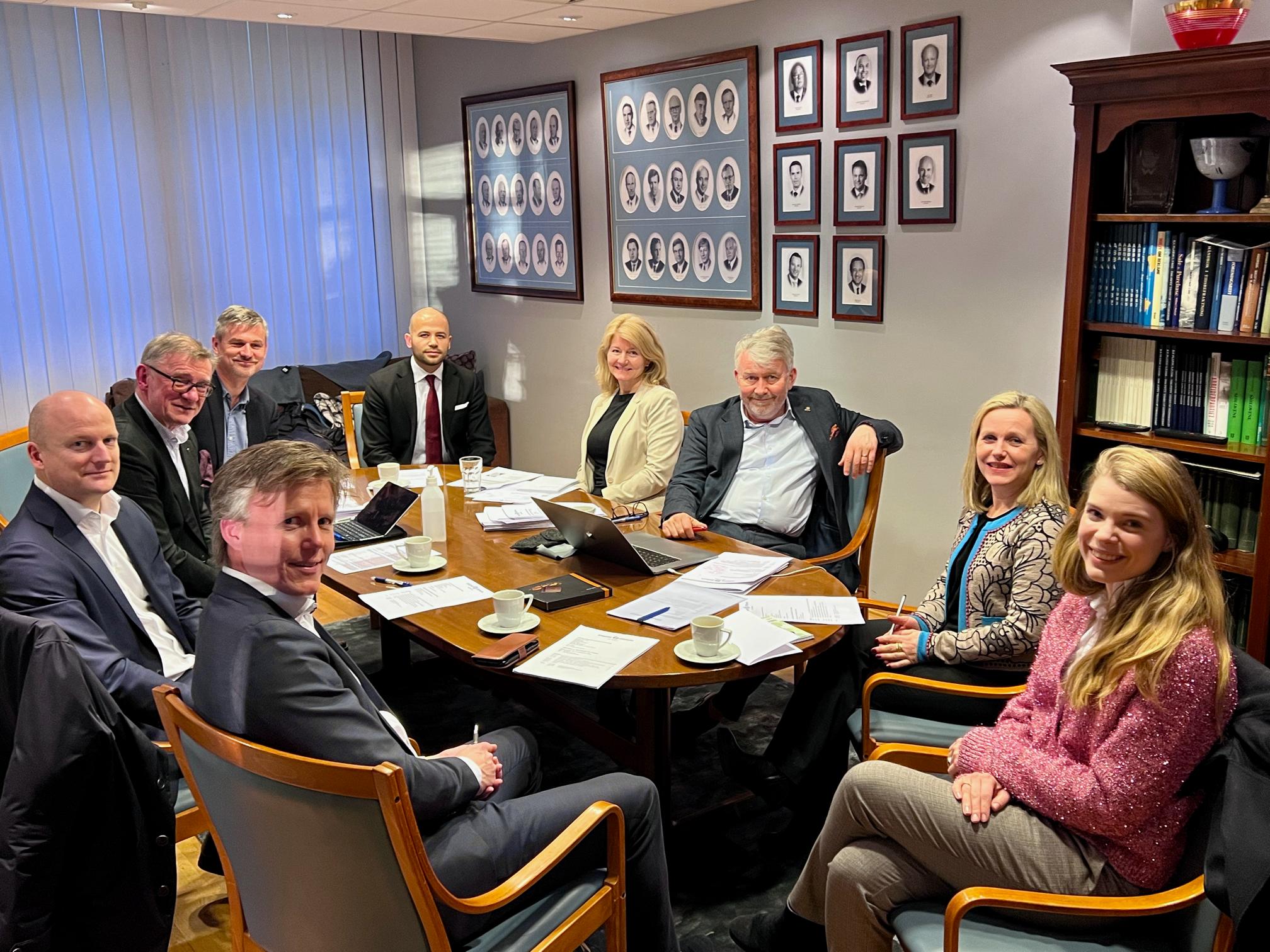
10 minute read
ANNUAL REPORT 2022
Report From The Board Of Directors
Shipping & Offshore Network was established in 1981 as Bulkforum and changed its name in 2013.
Advertisement
In 2018 we launched the Maritime Oslofjord Alliance, an alliance with Oslo Shipowners’ Association and Ocean Industry Forum Oslofjord. The Alliance has its own website www.maritimeoslofjord.no. With our association being the international one of the three, we are also looking to attract more members from abroad, particularly from the Nordic countries. Our members are from a variety of countries, altogether the Alliance comprises some 150+ companies. Through a membership in Shipping & Offshore Network with its 50+ members, foreign companies gain access to an entire cluster of maritime and ocean based companies in Norway and abroad.
While 2019 was our most active year for more than a decade, 2020 and 2021 turned out to be different than any year before, due to the covid-19 pandemic As we entered 2022 there was still a second lockdown in Norway. On 10 February we had our AGM, celebrating our 40th anniversary in 2021 one year late. So we had a relatively large panel with four panelists, discussing, among other things, why there would be no Russian invasion in Ukraine...
Annual Summit, which originally was planned for April 2020, with the timely title “The way forward: Strategies for maximising your options” was first rescheduled to September 2020, then postponed to April 2021, however we finally held it on 7–8 April, 2022.
In 2022 we organised several in-person events, AGM, Annual Summit, Market Update Meetings in Oslo and Bergen, and our Shipping Academy conducted our classic 1-day course in Basic Shipping and Maritime Law, however with a new setup. We also co-organised the second Klaipėda Manifesto in September, manifesting our strong relationship with Klaipėda, following the Go LNG project collaboration (2016-2019) We, i.e. the Alliance, also were present at Nor-Shipping and ONS 2022
In addition, on 15 June the Alliance launched what had been called Project Retrofit, involving all three associations, their chairmen, the general manager, a consultant and a secretary. The report from the desk top study including interviews with international and national experts on the subject was named “Energy transition in shipping – facts and timeline” and looks at what can be achieved with regards to decarbonization of the existing vessel fleet in a 3-5 years perspective (tank, bulk, container).
The Board is pleased to sum up an active year. Our turnover was NOK 1,344,067 with a deficit of –41,375.
Oslo, 14 February, 2023
Our Board, clockwise: André Borge, Kjartan Bru, Per Olaf Brett (chair), Arnstein Eknes, Jan Peder Myklebost, Margrethe Bøe Landro, Tom O. Kleppestø (our general manager), Helene Westfal-Larsen, and Marthe L. Sandvik.
The Members Meetings
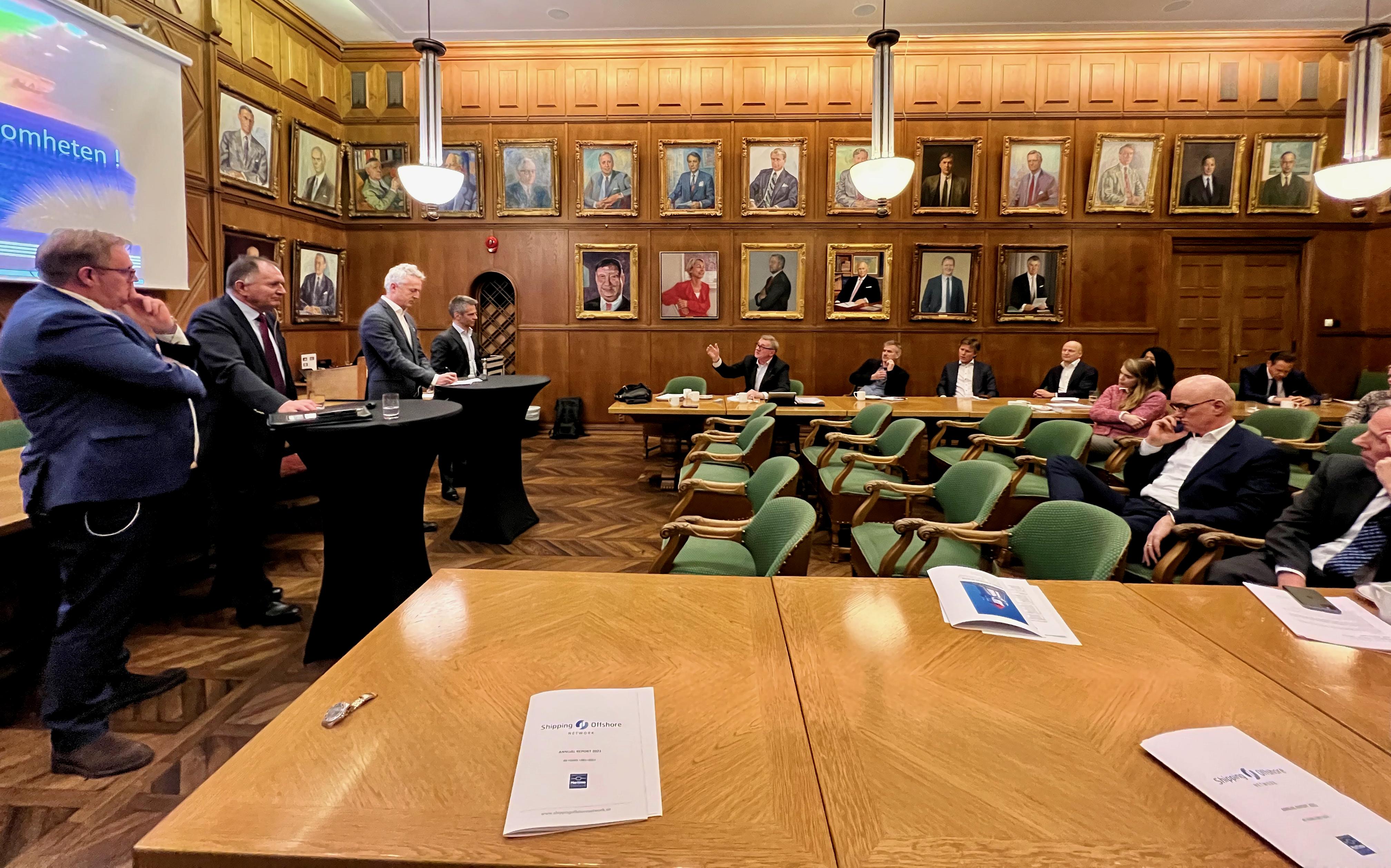
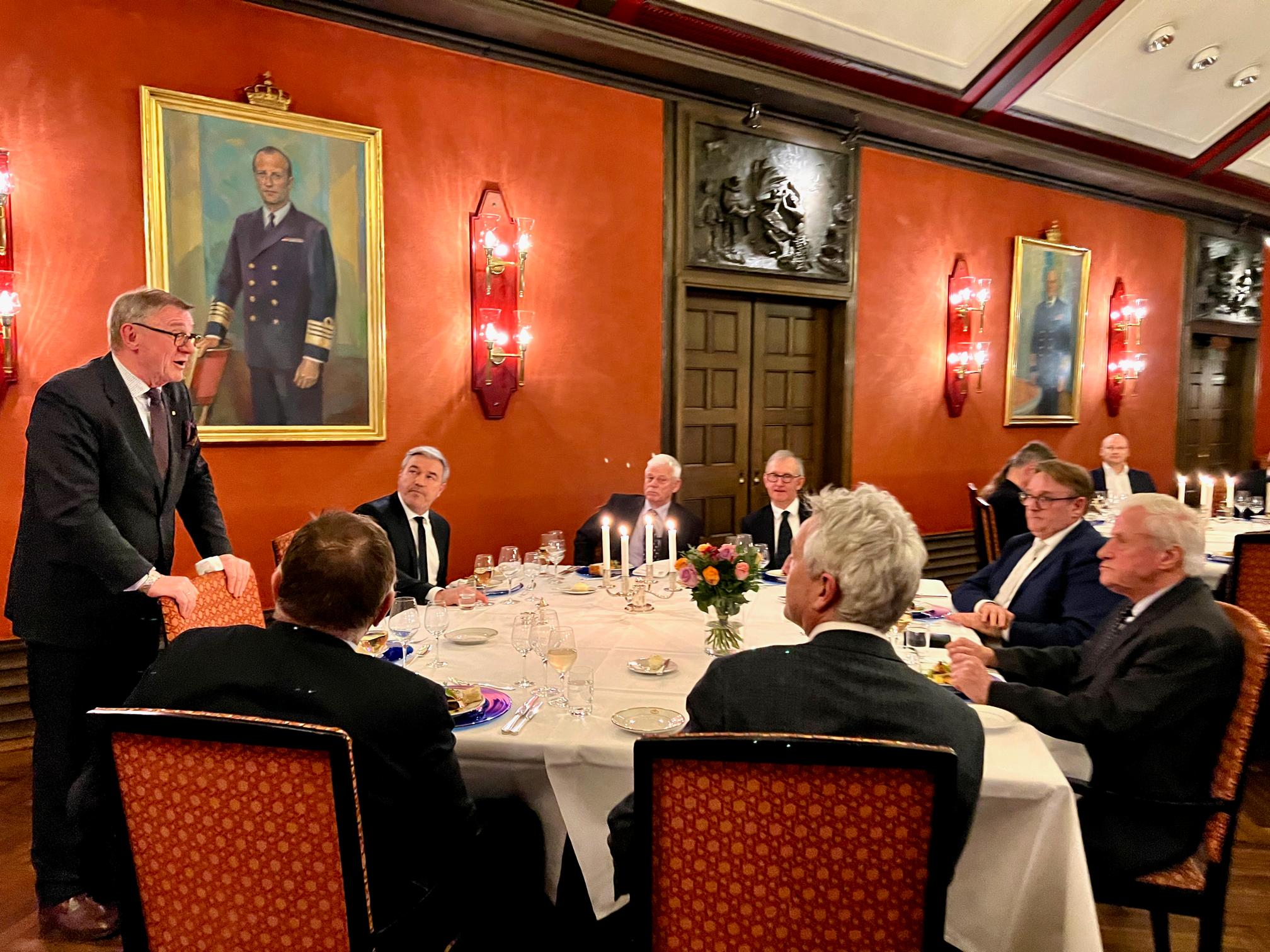
FEBRUARY: Our Annual General Meeting was held on Thursday 10 February. Present were altogether 38 attendees: 20 delegates representing 19 members, in addition to guests and the General Manager, Tom O. Kleppestø, who was elected to sign the protocol. Marthe Lamp Sandvik (DNB Bank) left the board after 5 years and Margrethe Bøe Landro replaced Audun Baardsen from G2 Ocean:
¡ Per Olaf Brett (chairman)
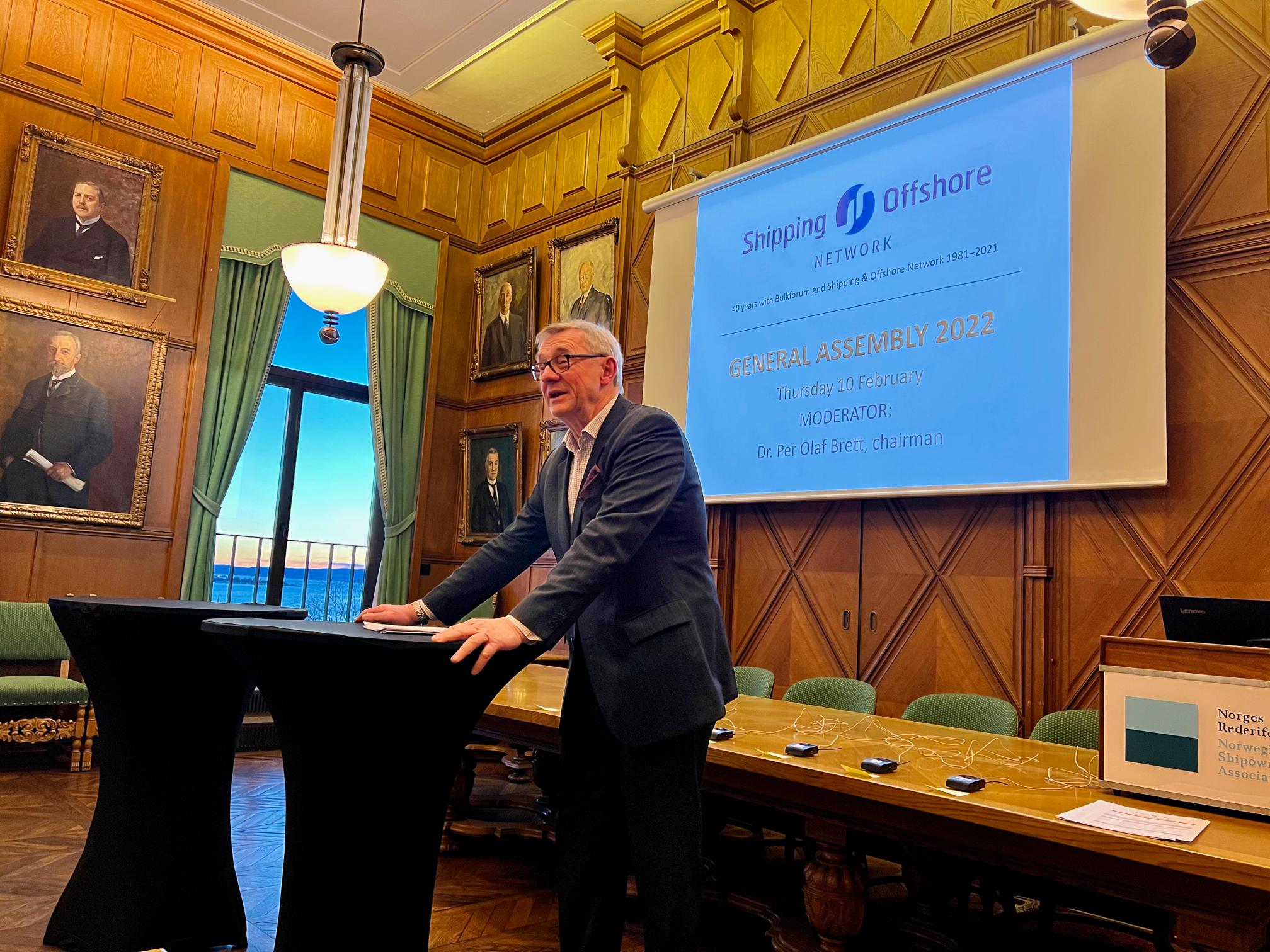
Ulstein International AS
¡ Helene Westfal-Larsen
Westfal-Larsen Shipping AS
¡ Arnstein Eknes
DNV AS
¡ Kjartan Bru
BNP Paribas SA Norway Branch
¡ André Borge
Wagle Chartering AS
¡ Jan Peder Myklebost
¡
Hydro Aluminium AS
Margrethe Bøe Landro
G2 Ocean AS
After the AGM followed the seminar on “The Pandemic and Consequences for Global Shipping – for Trade, Security, Finance, Operations and the People Factor” with Ulf Sverdrup, Director, NUPI Norwegian Institute of International Affairs; Sverre Diesen, Researcher, Norwegian Defence Research Establishment (FFI), Engebret Dahm, CEO, Klaveness Combination Carriers ASA; and Hans Sande, President, International Federation of Shipmasters' Associations.
The seminar finished at 19.45 and then followed, with some speeches anniversary and the two years with pand
MARCH: After being one of 19 project partners in the Go LNG project (Interreg BSR) in 2016-2019, it was time to try to become involved in one more such project, and so we were invited to take part in a consortium with a plan to submit a project proposal called “Blue Supply Chains” (BSC). We all met in Hamburg on 31 March and 1 April (see photo).
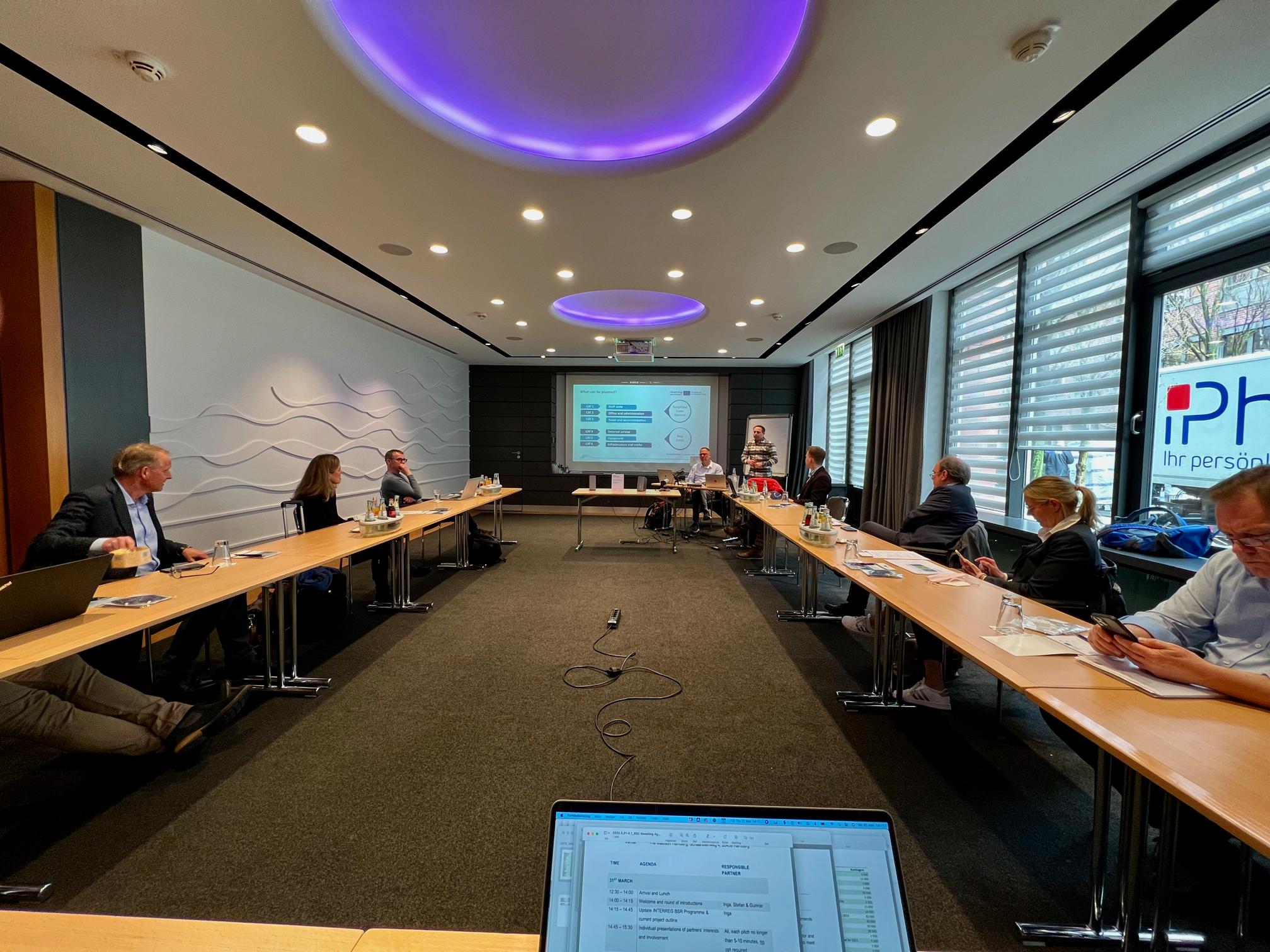
Lead partner is Hafen Hamburg Marketing e. V. wich is a subsidiary of Port of Hamburg. Luckily the project was approved in October, so we will come back to this in next year’s annual report with more information.
APRIL: For the first time we, Shipping & Offshore Network as part of the Maritime Oslofjord Alliance, had a stand at Nor-Shipping, which took place on 4-8 April. The stand was made possible through financial support from Oslo Maritime Foundation. Our stand manager was Ms Agnese Zvirbule, who greeted visitors and got some new contacts for us. Many members and ocean industry colleagues came by, also a delegation from Klaipēda, Lithuania.
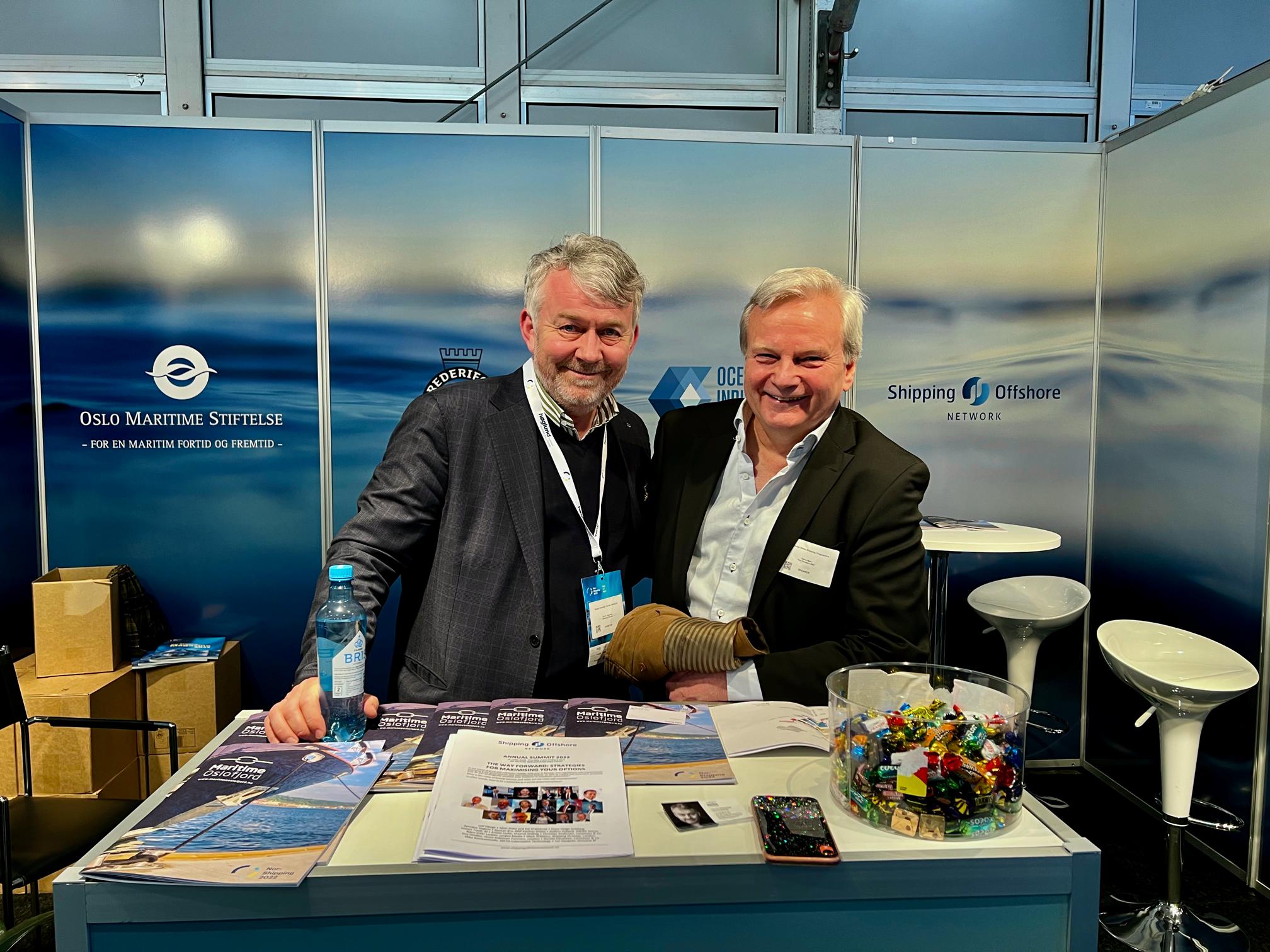
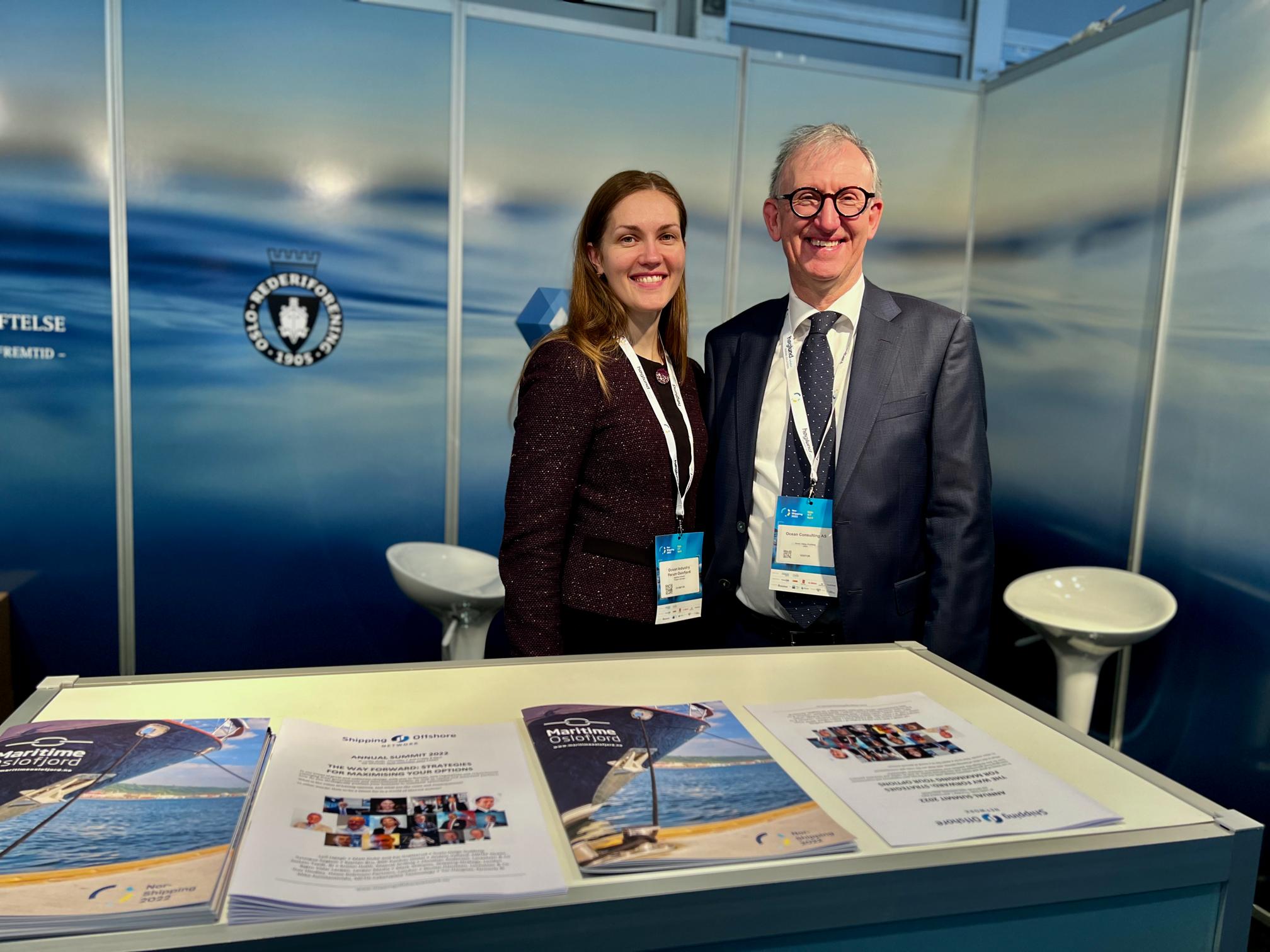
During Nor-Shipping we held our Annual Summit on 7–8 April at Losby Gods, for the first time since 2019. The topic, which was decided for the 2020 summit that had to be postponed and then cancelled, was “The way forward: Strategies for maximising your options” – a very timely one, as it turned out
Our question was: In our times of great and unknown change, with war in Europe, new regulations and requirements emerging from governments and international bodies, as well as capital and insurance partners; how do you strategically position your business to maximize optionality? What is the value of having options, and what are the costs and consequences? In other words: How to be a smart fox in a world of shrewd wolves?
Our opening keynote speakers were Leif Høegh from Höegh Capital Partners, Matt Duke and Kai Grøtterud from Grieg Maritime Group, and Synnøve Seglem, Knutsen OAS Shipping
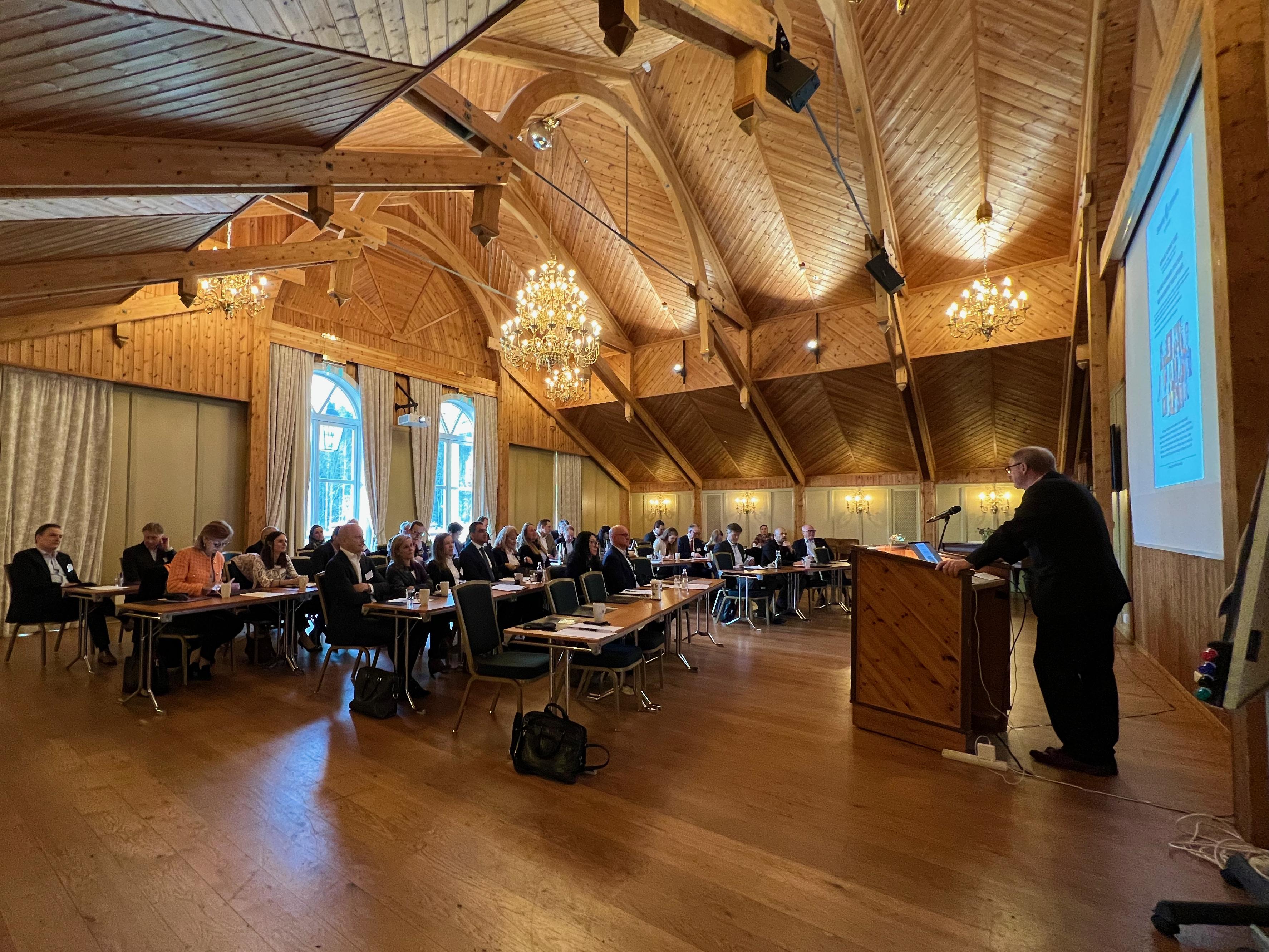
Only two weeks before, Synnøve had been elected the new president of the Norwegian Shipowners’ Association.
Other speakers and panelists:
§ Svein Helge Guldteig on behalf of the Maritime Oslofjord Alliance, presenting the report
§ Kjartan Bru, BNP Paribas, Oslo
§ Anders Valland, SINTEF Ocean, Trondheim
§ Jostein Tvedt, BI Norwegian Business School
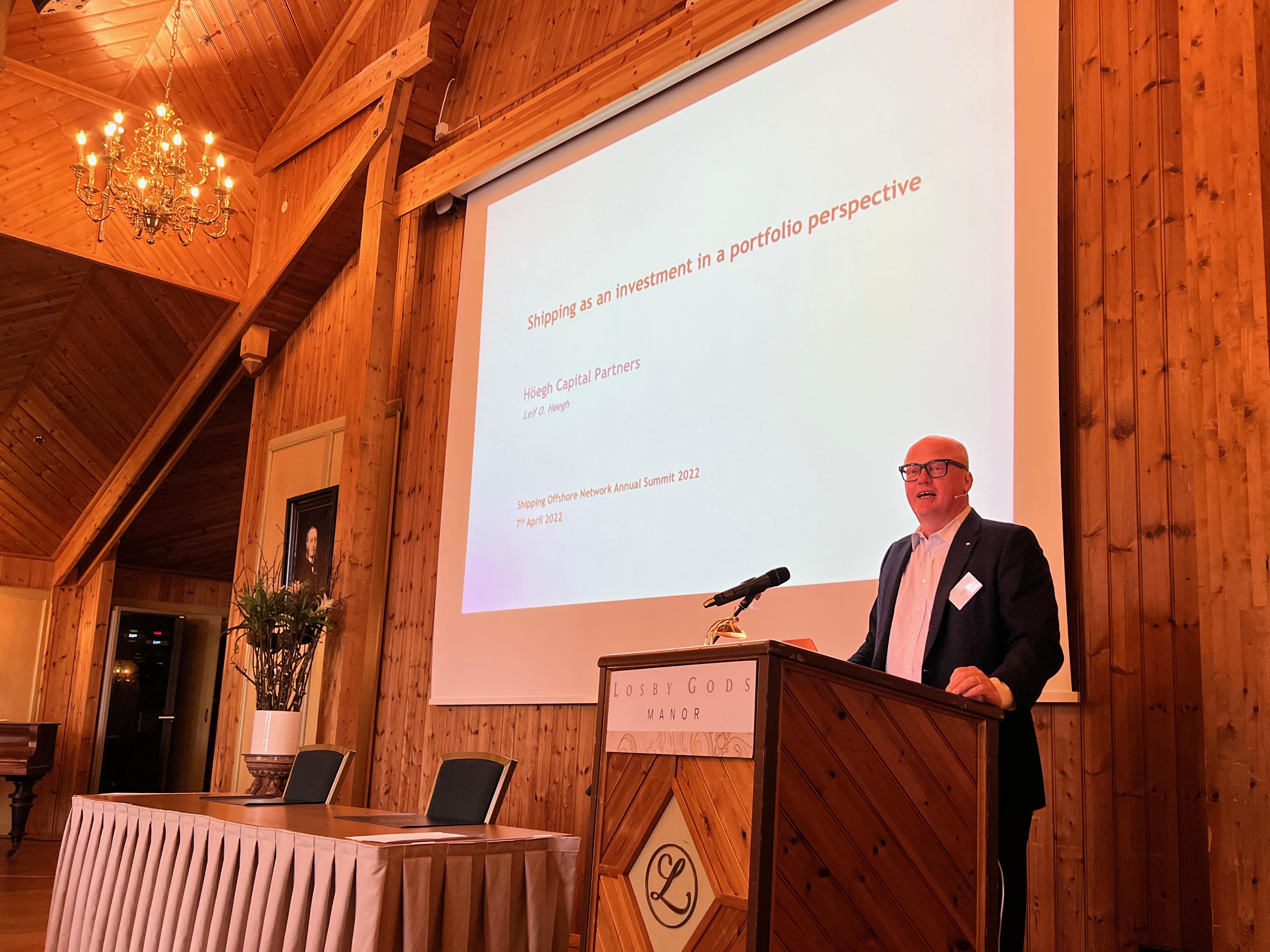
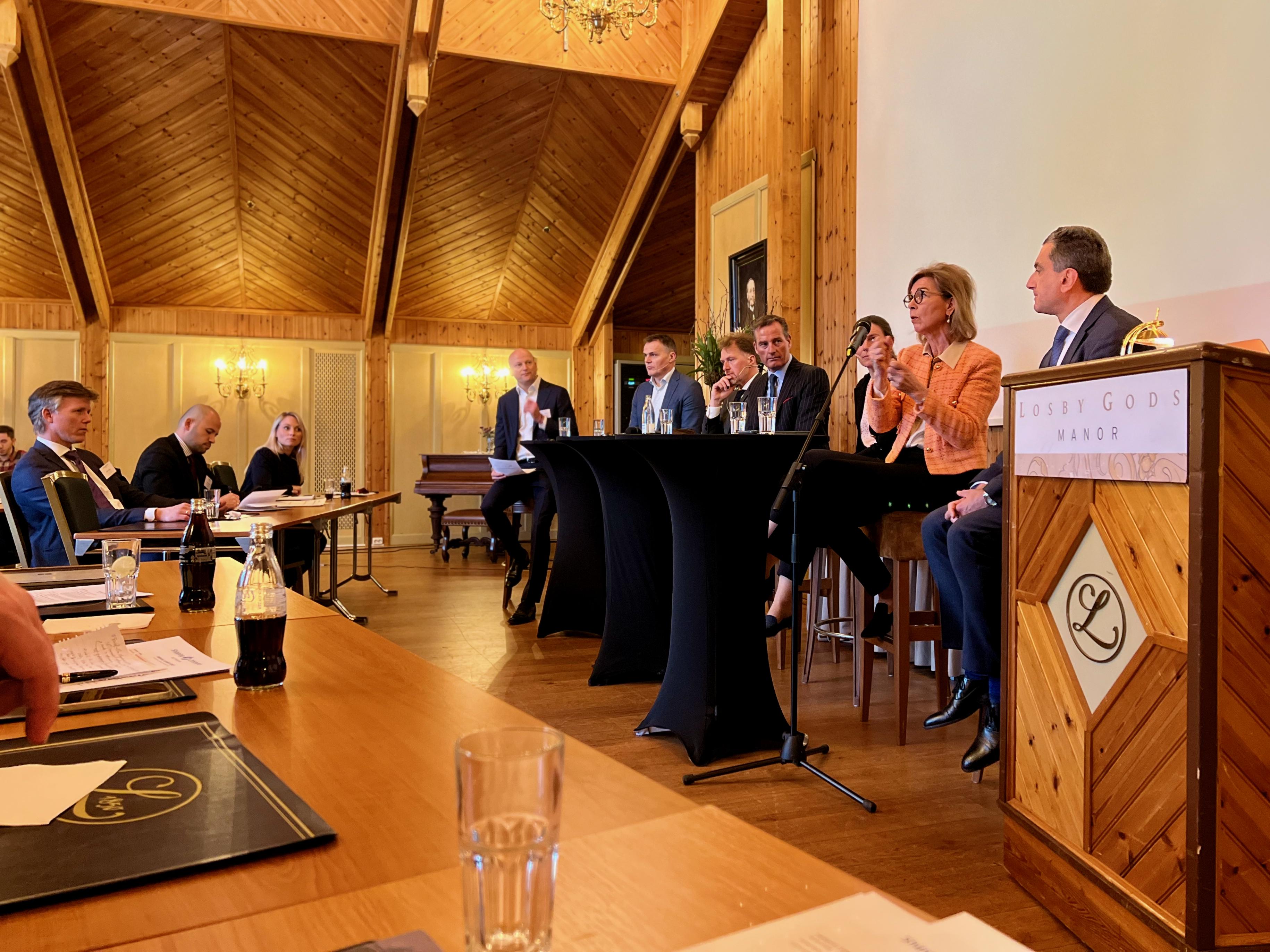
§ Kristin Holth, Board Member, Maersk Drilling
§ Christian Andersen, Chair, Lorentzen & Co
§ Bjørn Vidar Lerøen, Lerøen Media, Stavanger
§ Mark Williams, Shipping Strategy, London
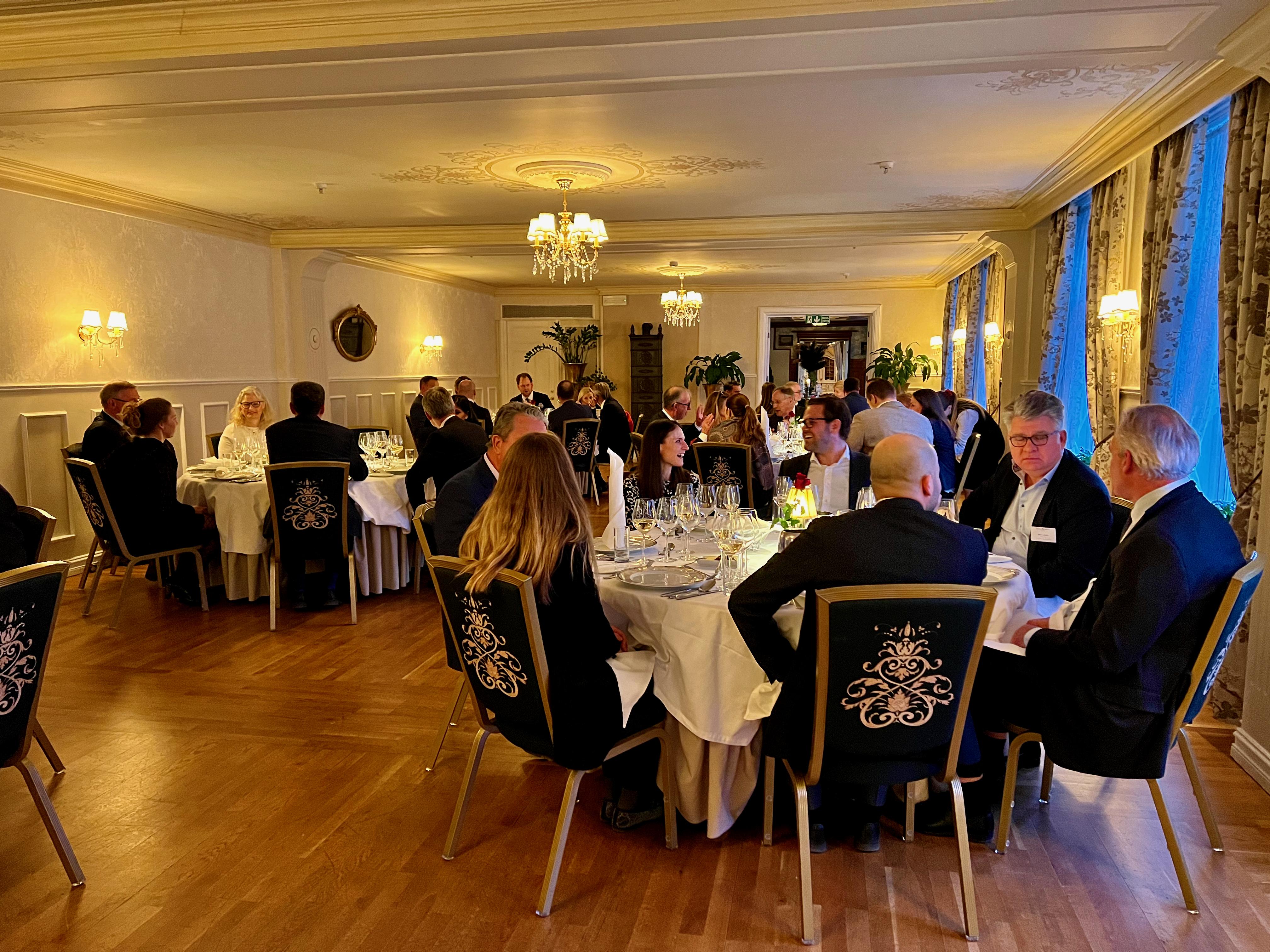
§ Guy Hindley, Howe Robinson Partners, London
§ Nicolai Hansteen, Lorentzen & Co
§ Mike Konstantinidis, METIS Cyberspace, Greece
§ Tor Haugnes, formerly BI, closing speaker
It was an interesting summit with people happy to meet & greet in person again, after the pandemic.
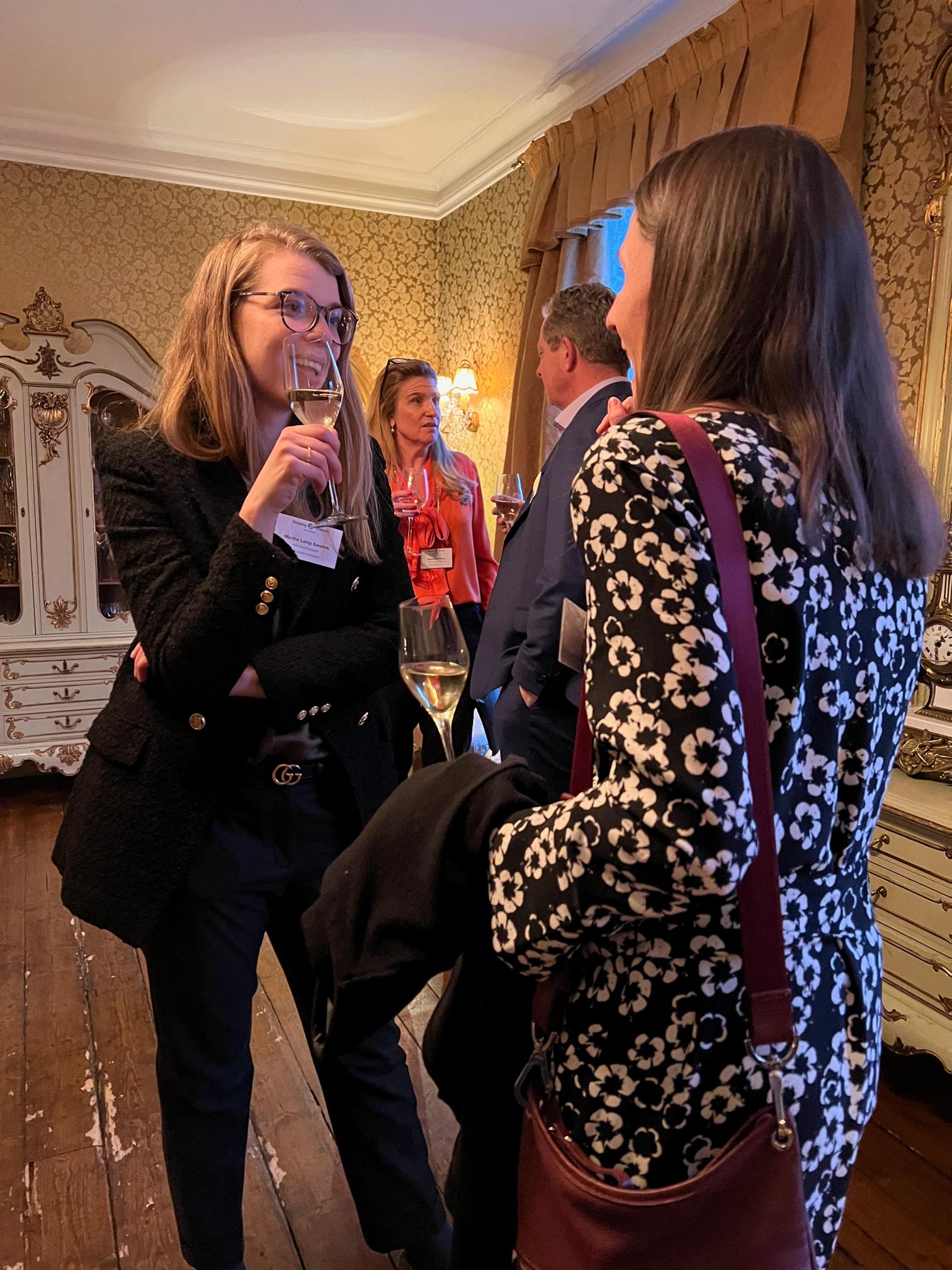
JUNE: On 13 June the Maritime Oslofjord Alliance organised a summer evening trip with S/S Christian Radich for our members.
That was highly appreciated among all who joined us that evening, like these three happy sailors:
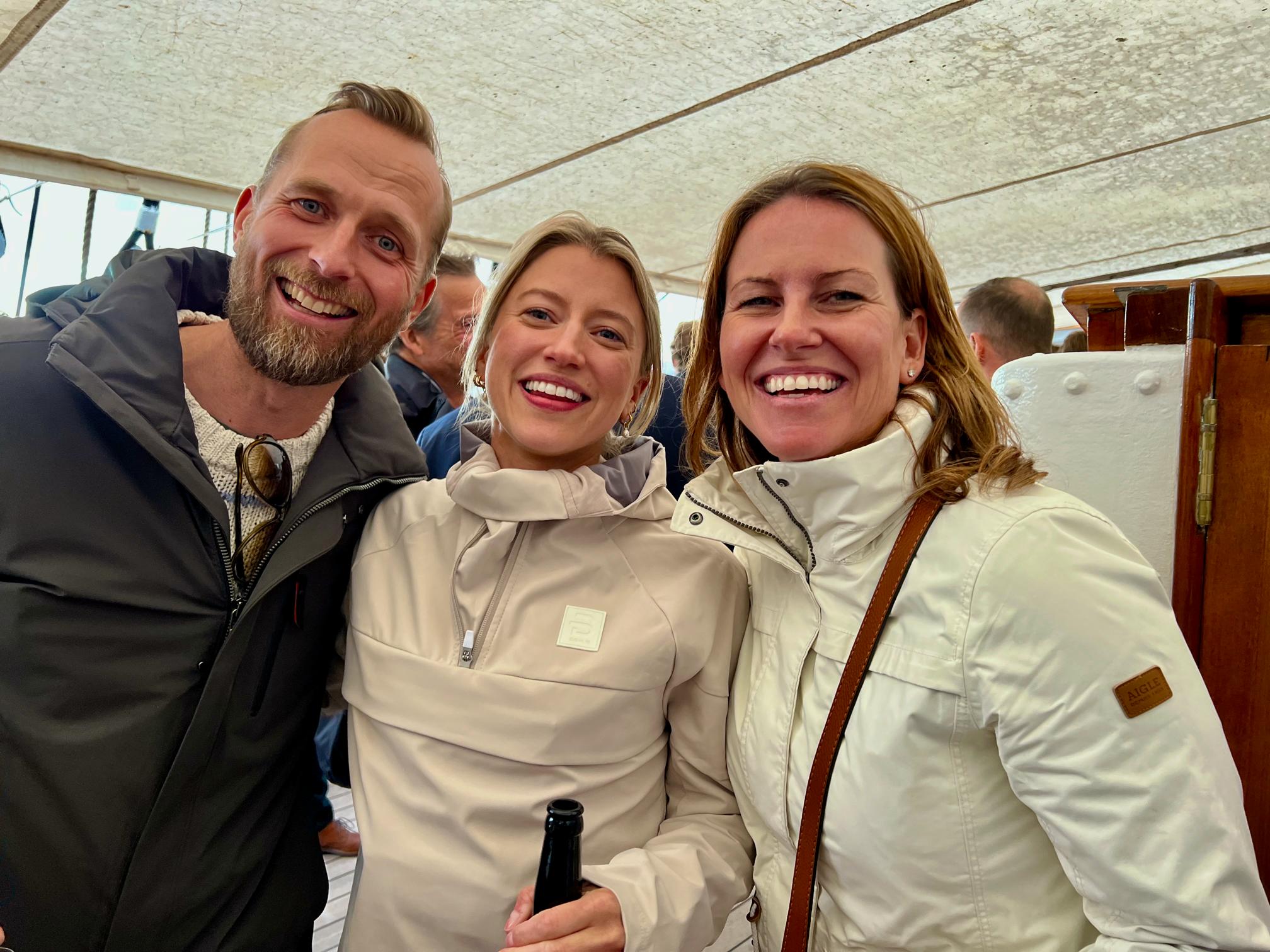
§ Per Martin Tanggaard, Nor-Shipping
§ Martine Bay, Grieg Maritime Group
§ Gudrun Helset, Klaveness Digital
Two days later, on 15 June, we launched our report “Energy transition in shipping – facts and timeline” with a press release to 1,100 newspapers and media around the world. The Maritime Oslofjord Alliance had since August 2021 prepared a report through what was originally called Project Retrofit, where we have looked at what can be done with existing tonnage within tank, bulk and container in 3-5 years time, to be as much as possible compliant in relation to emission reductions. And a lot of other things in the same sling.
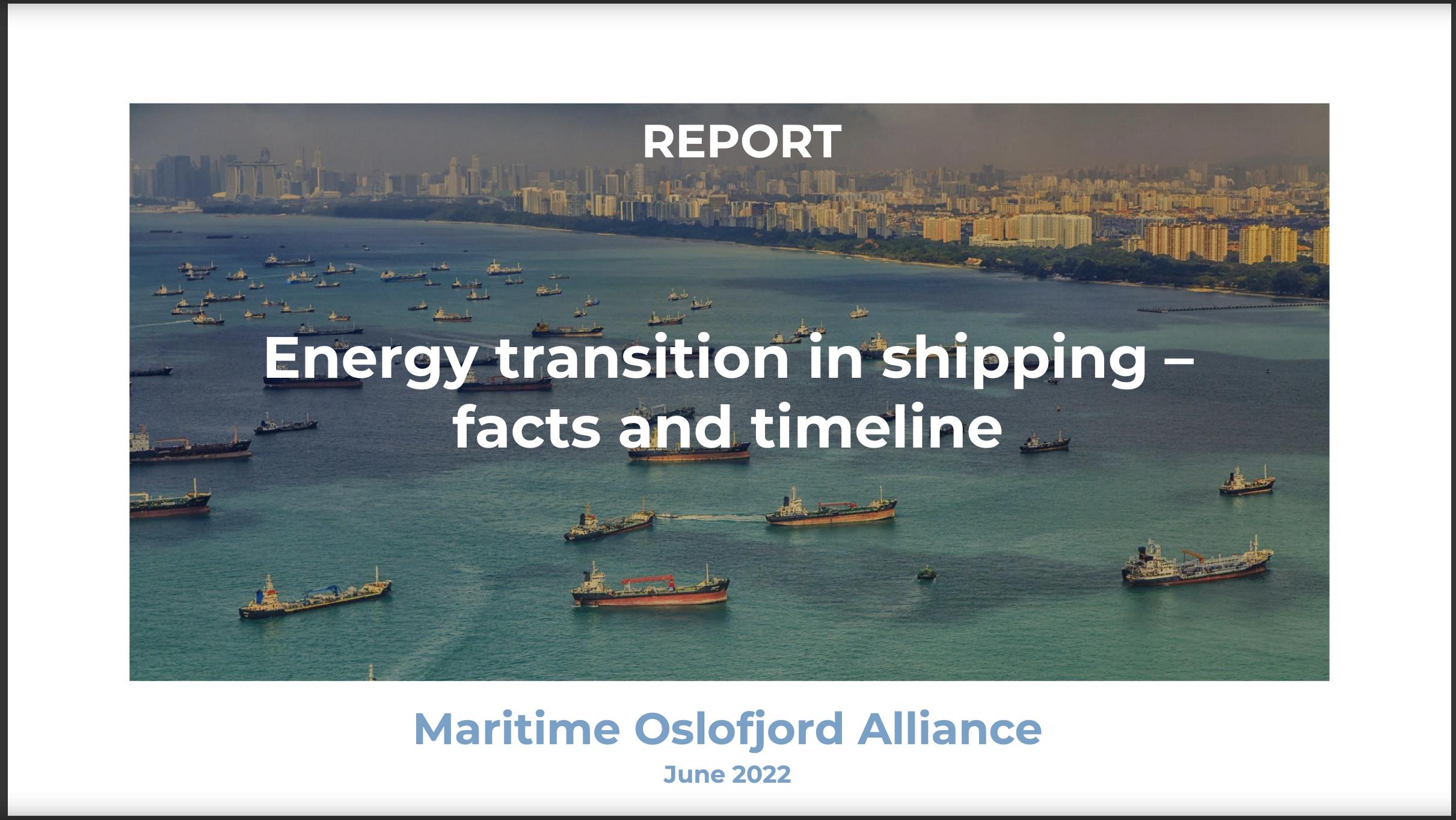
The report was funded by Alliance member Oslo Shipowners’ Association as well as Oslo Maritime Foundation and written by Svein Helge Guldteig of Ocean Consulting AS, a member of Ocean Industry Forum Oslofjord (OIFO), one of the three Alliance partners. Here is a brief summary:
Fuel Consumption Burning Issue In The Race For Ship Emissions Compliance
Operational and technical measures are the most viable route to emissions abatement and compliance for the existing fleet of tankers, bulkers and container ships as many of these are unsuitable for low-carbon fuel conversions that can also pose commercial and other risks, according to the study which has assessed the commercial and technical viability of measures to cut emissions in the three ship sectors over the next three to five years.
According to the study, the three segments of vessels above 5,000 tonnes deadweight account for about 80% of the greenhouse gas emissions (GHG) from the world fleet of around 94,000 vessels. Some 19,000 vessels of more than 25,000 gross registered tons, or 21% of the global fleet, consume 65% of all fuel used in shipping.
Resolving GHG emissions in the larger container, bulker and tanker segments will have an immediate and larger impact on the total emissions than any other shipping segment as they have the ships that consume the most fuel.
The study also states that only around 15%, ie. 2,700 tankers, bulkers and containerships, are outfitted with electronically controlled main engines that make them viable for conversion to alternative fuels, which could cut emissions by 100 million tonnes annually.
Zvirbule, project secretary, Jon Rysst (DNV), chair, Ocean Industry Forum Oslofjord, and Tom O. Kleppestø, General Manager, Maritime Oslofjord Alliance, which includes Shipping & Offshore Network.
Therefore, “most existing ships will have to find other applicable ways and means to reduce emissions based on tangible technical and operational measures”, states the report.
AUGUST: On Wednesday 31 August Centre for Ocean Business (OBZ) at BI Norwegian Business School and the Maritime Oslofjord Alliance organised a seminar called “Floating Offshore Wind: Business Models for Global Competitiveness”
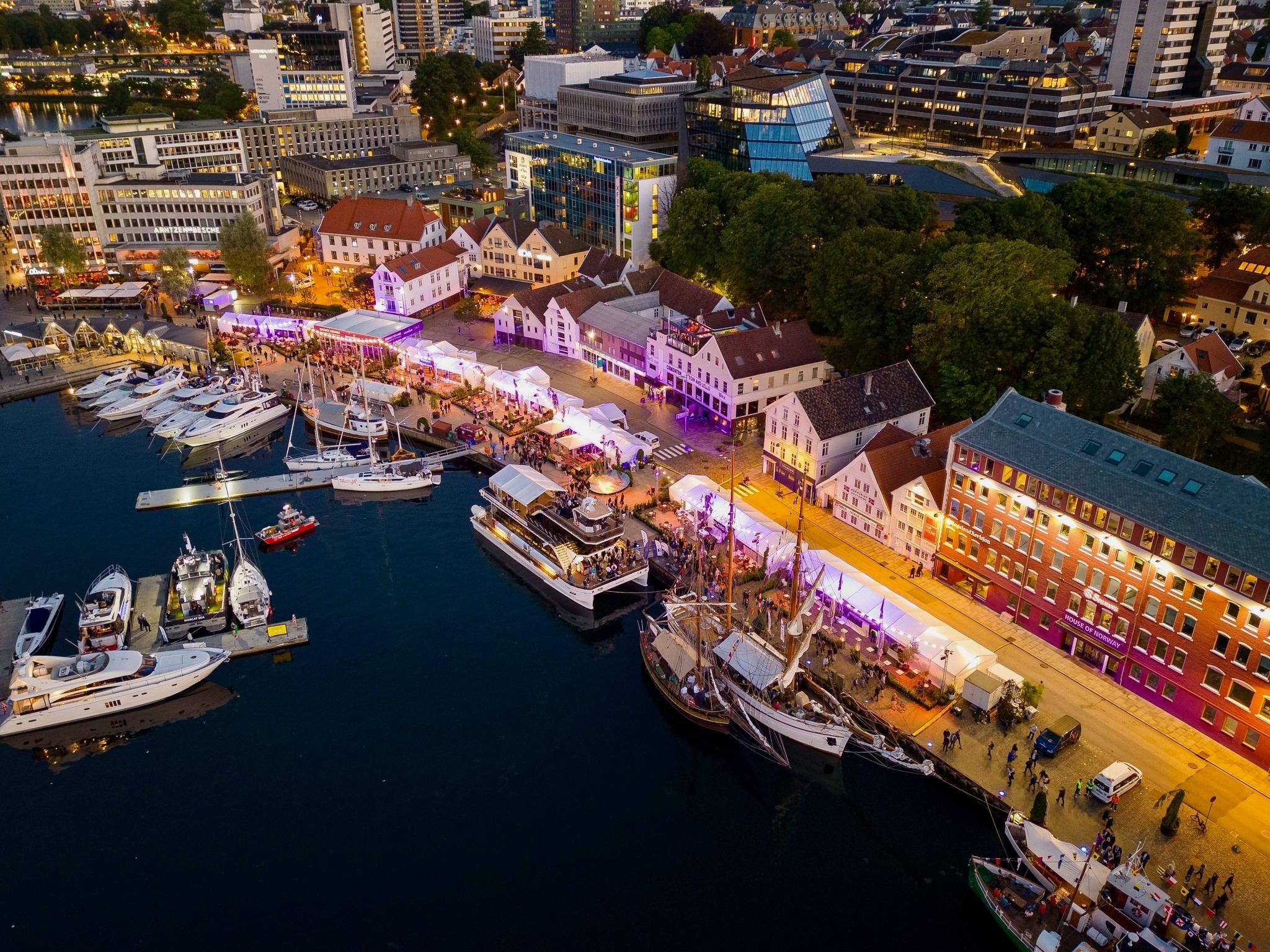
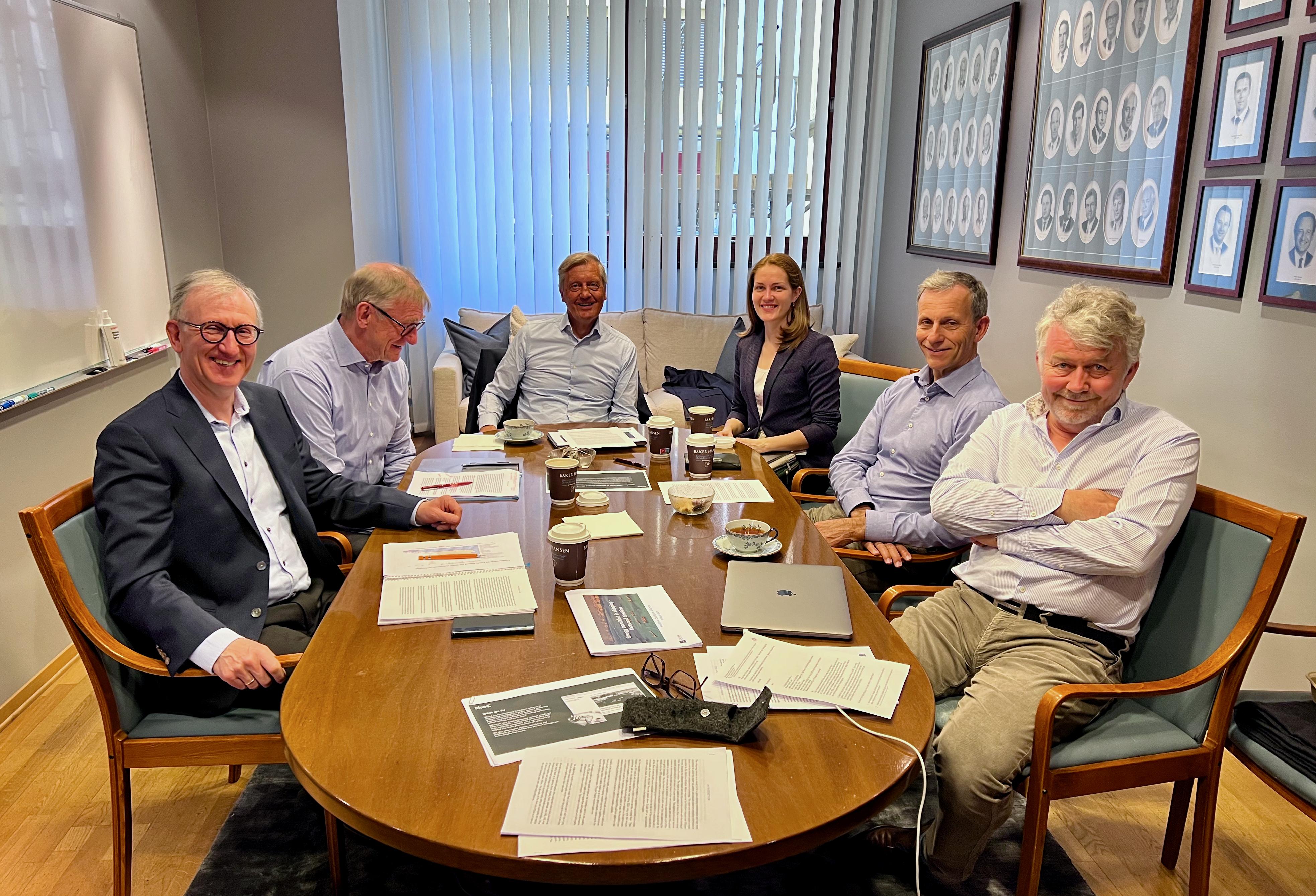
The seminar was held on board Brim Explorer's first vessel, MS Brim, in Vågen. The seminar took place just before the closing concert starting at 20.00, so Vågen in Stavanger was packed and the vibe was amazing, even electric, also due to the lovely weather.
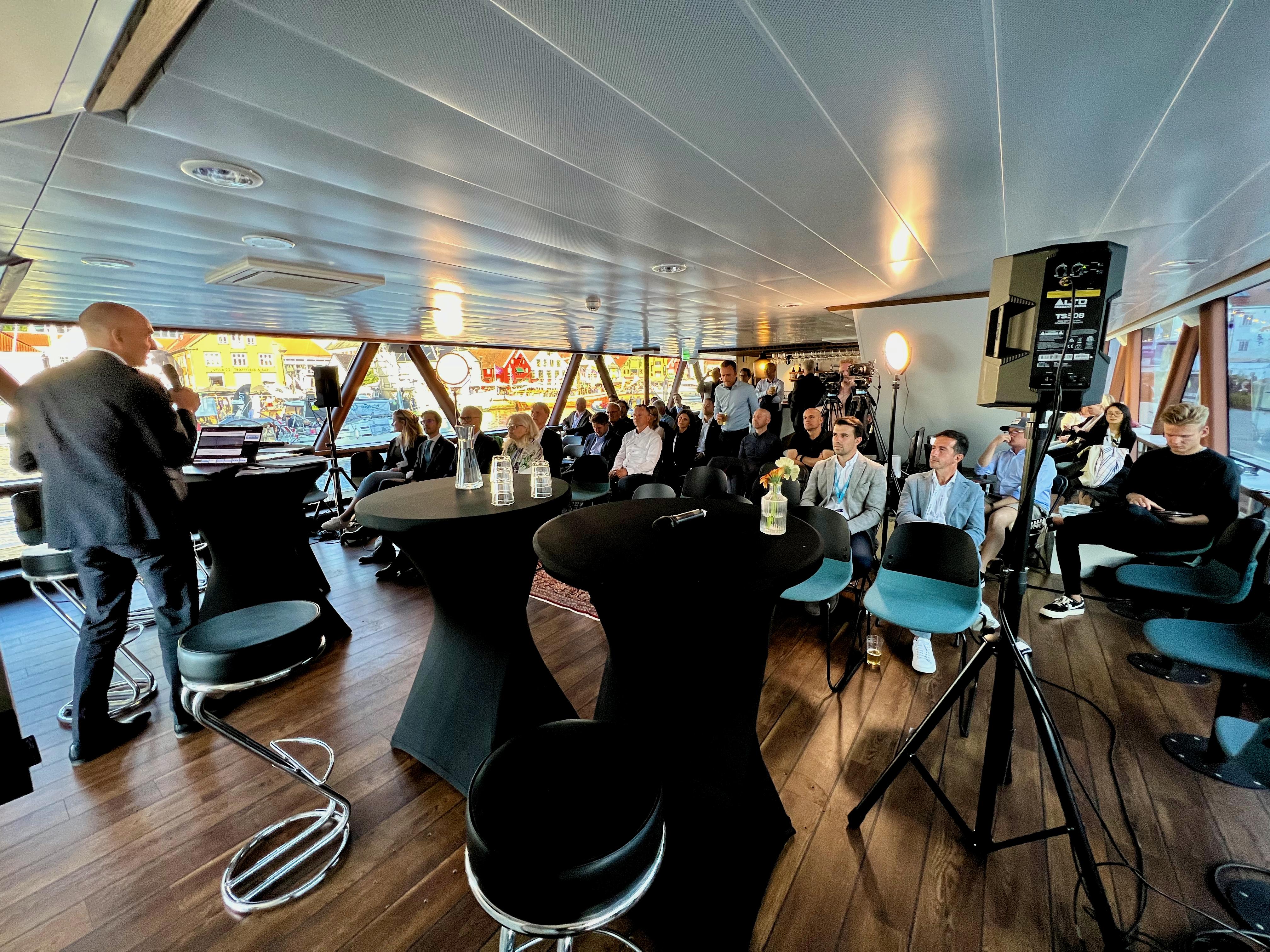
The speakers and presentations were:
§ Welcome and short introduction by the moderator Tom O. Kleppestø, the Maritime Oslofjord Alliance
§ Elements of business models and their success factors. The role of publicprivate partnerships in developing global business models. Underlying questions:
To what extent do business models for offshore floating wind differ from oil/gas? What are the main challenges for Norwegian firms to take part in this industry? What is the role of public sector, and partnerships between public and private to succeed in this global industry? by Randi Lunnan, professor and director, Centre for Ocean Business (OBZ) at BI Norwegian Business School
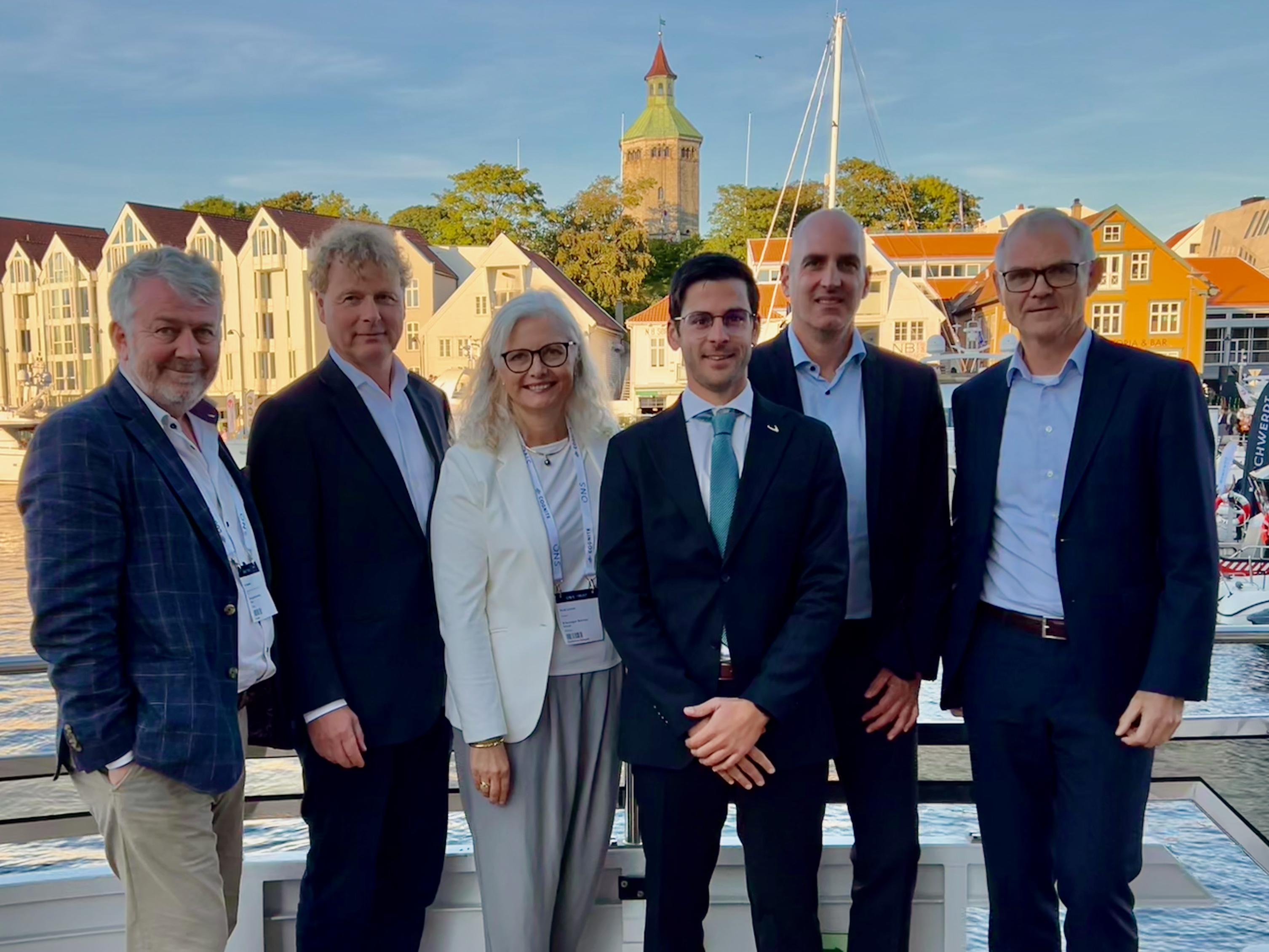
Underlying hypothesis: Is it a question of resources, competence, experience, cost, or networks?
§ Perspectives of a supplier by Olav Weider, CEO, Dr.techn. Olav Olsen AS
§ Perspectives from finance, role of public-private partnership, by Olav Einar Rygg, Chief Commercial Officer, Large Clients (Eksfin)
§ Race to market by Knut Vassbotn, CEO, Deep Wind Offshore AS
§ Ulstein – reflections from 10 years into the offshore wind market by José Jorge Garcia Agis, Deputy Managing Director, Ulstein International AS
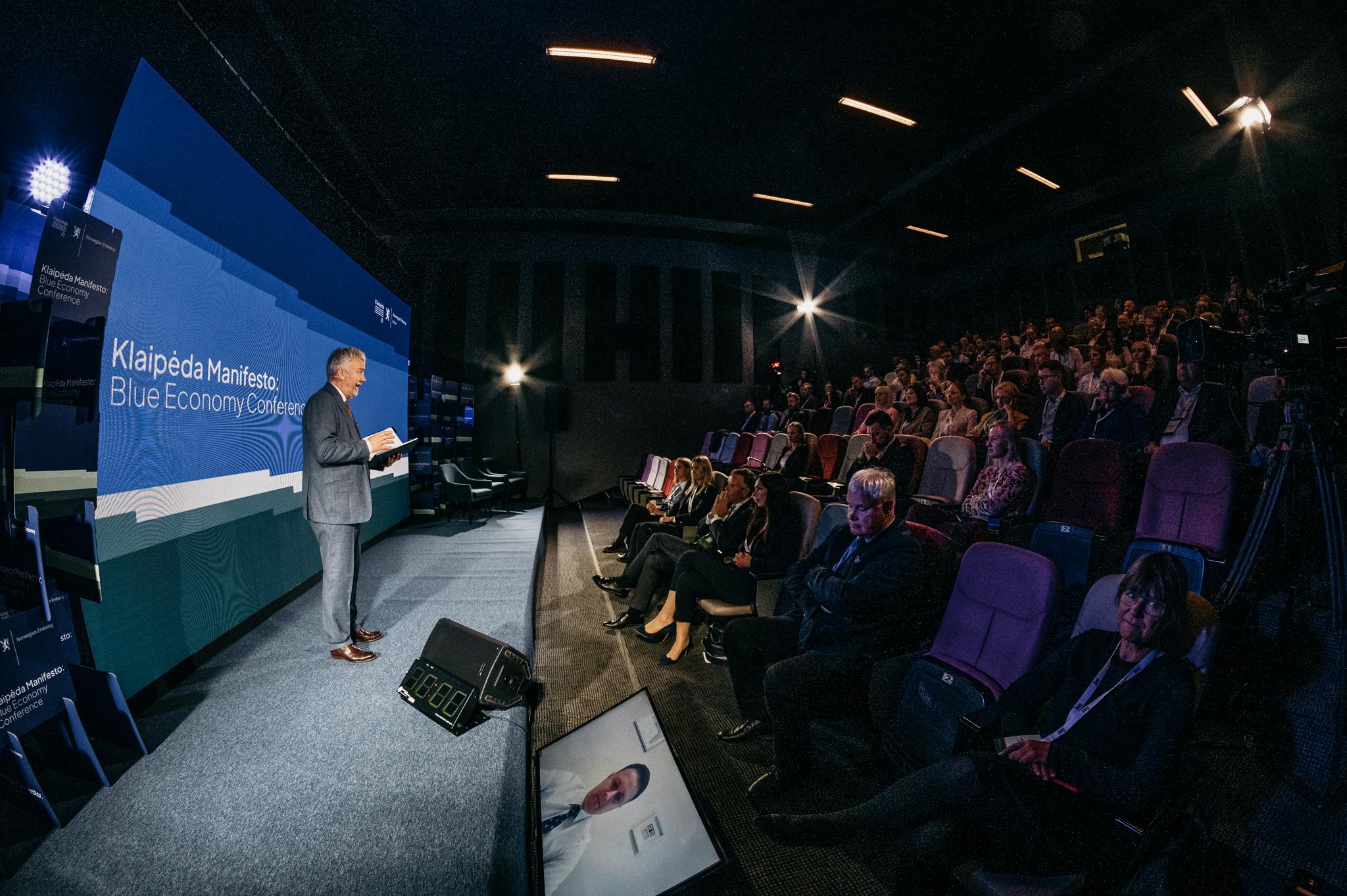
§ Contractual perspectives on supplier models for ocean wind projects by Christopher Riel, Head of Contracts, Fred. Olsen Renewables AS
§ Q&A session
SEPTEMBER: “Klaipėda Manifesto: Blue Economy” was a 2-day conference in Klaipėda, Lithuania, on 15 and 16 September.
It was co-organised between Klaipėda ID, Klaipėda Science and Technology Park, our member Klaipėda Free Economic Zone, the Norwegian Embassy (Norway Grants), NorwegianLithuanian Chamber of Commerce in Vilnius and the Lithuanian-Norwegian Chamber of Commerce in Oslo, Höegh LNG, and Shipping & Offshore Network.
Our embassy was co-financing the conference, and our general manager was co-moderator. There were several Lithuanian ministers and vice-ministers speaking at the conference, as well as the Norwegian Ambassador, H E Ole T. Horpestad (photo), and the State Secretary in the Ministry of Trade, Industry and Fisheries, Mr Erling Rimestad.
This was the second Klaipėda Manifesto, which has manifested itself as a relevant meeting place for the Norwegian and Lithuanian maritime clusters.
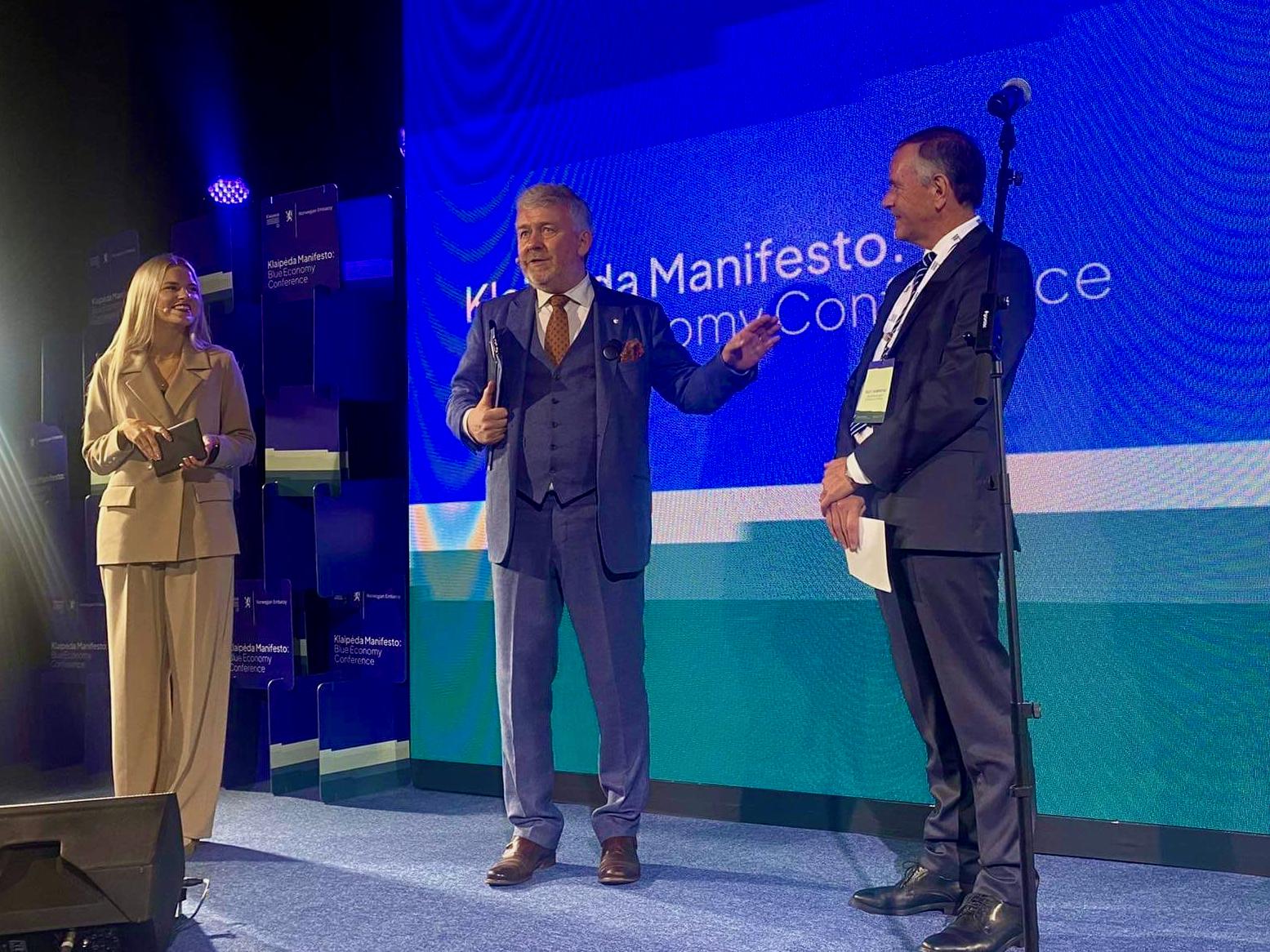
Half of the speakers were from Norway: CEO and cofounder Kristin Omholt-Jensen from our member Maritime Optima AS (also member of OIFO), Ole Christian Troland from OIFO member Eco Subsea AS, Thomas Bjørdal from the Norwegian Renewable Cluster and Eivind Hestvik Brækkan from the Norwegian Seafood Council.
Photo shows Ole Christian Troland right and Kristin Omholt-Jensen next to him, as well as Rita Sakus, from business angel network LitBan, and Elijus Čivilis, CEO in Invest Lithuania, former vice-minister
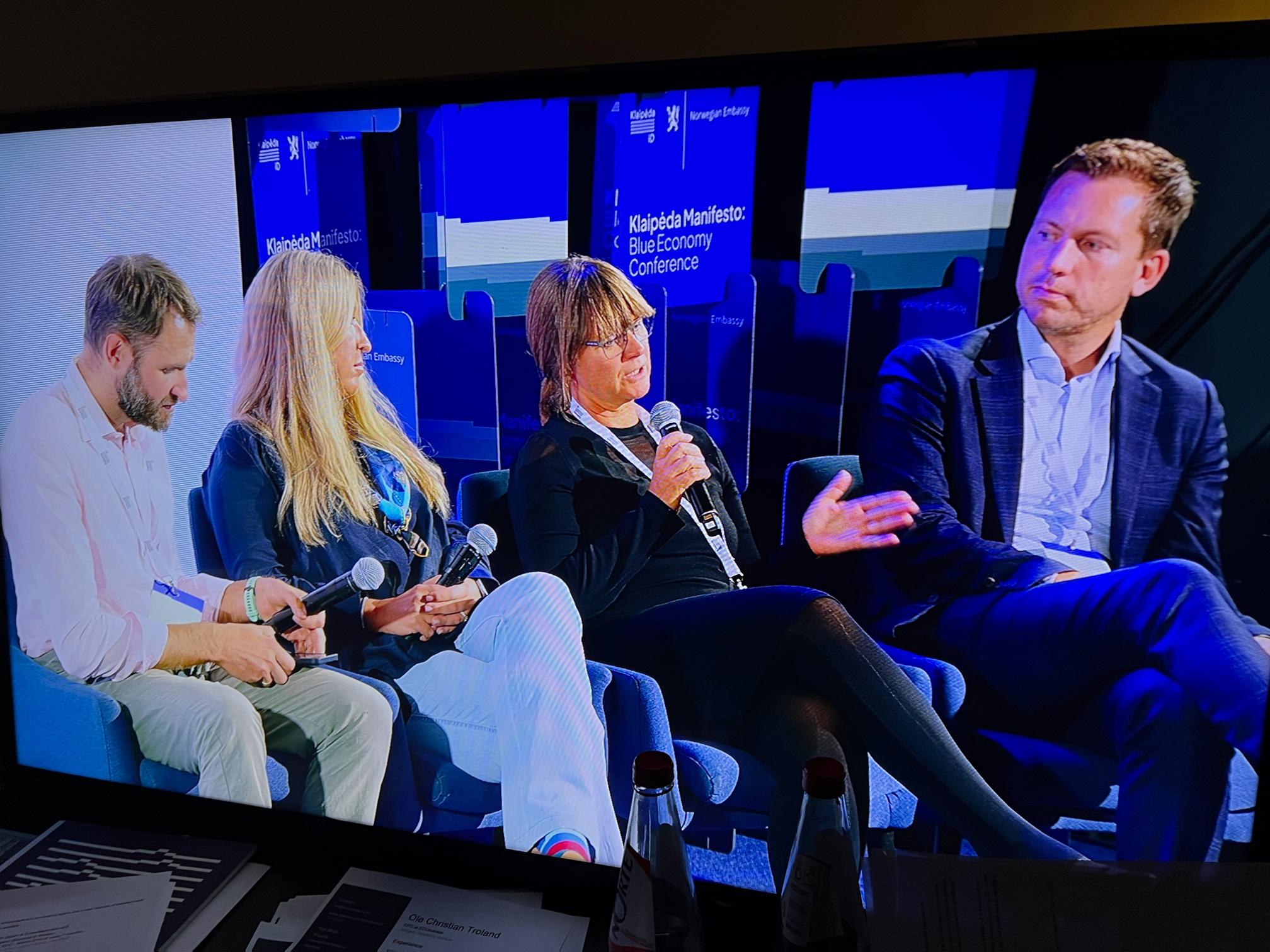
DNV and Höegh LNG were also represented with local executives.
OCTOBER: Our annual Market Update Meetings were again held both in Oslo and Bergen, on 18 and 25 October, respectively.
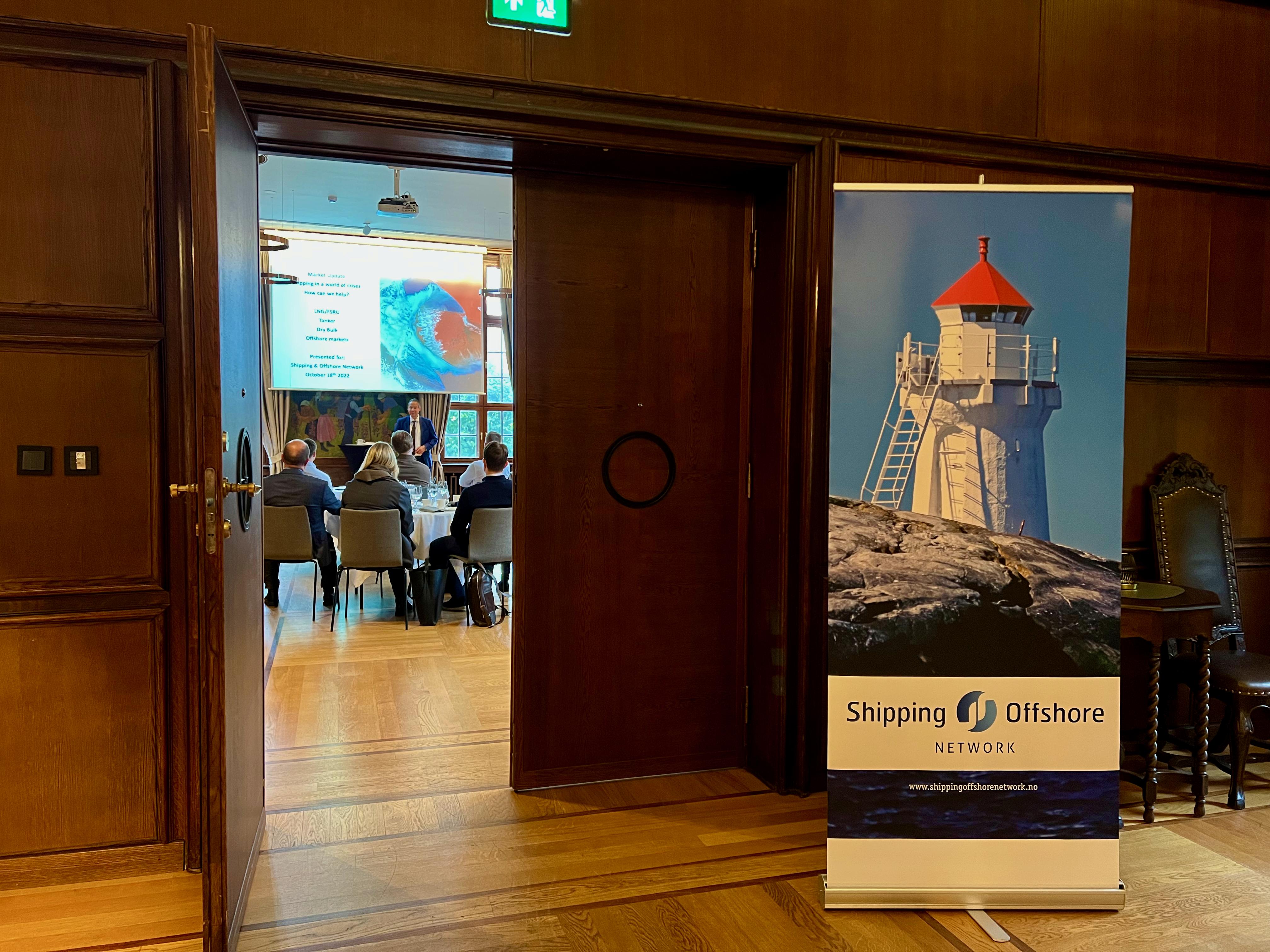
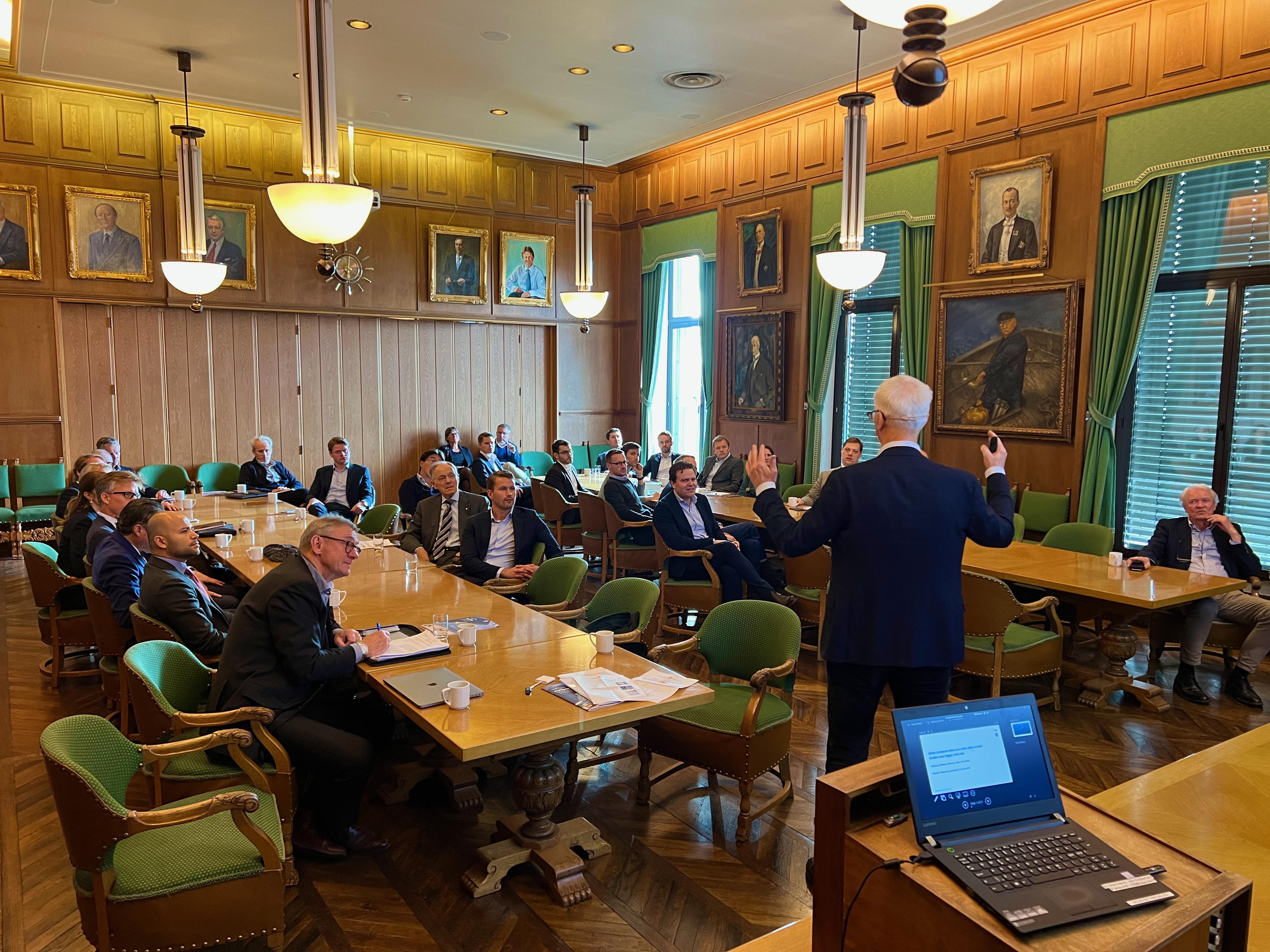
As always, professor Øystein Thøgersen from the Norwegian School of Economics (NHH) gave a presentation on the current global macroeconomic picture, this year entitled “Global prospects when one crisis ebbs out and another even bigger crisis hits”
He was followed by Nicolai Hansteen, Chief Shipping Analyst at Lorentzen & Co, with "Shipping in a world of crises: How can we help? LNG/FSRU, Tank, Dry Bulk & Offshore markets".
Then, in Oslo, Sverre Bjørn Svenning, Senior Advisor at Fearnleys and Fernresearch, gave an interesting and timely presentation on "Rules and fuels", whereas in Bergen his colleague Dag Kilen, Head of Fernresearch and Senior Advisor Oil & Tanker Markets, Fearnleys, gave a similarly timely presentation on "Navigating in a world of confrontations".
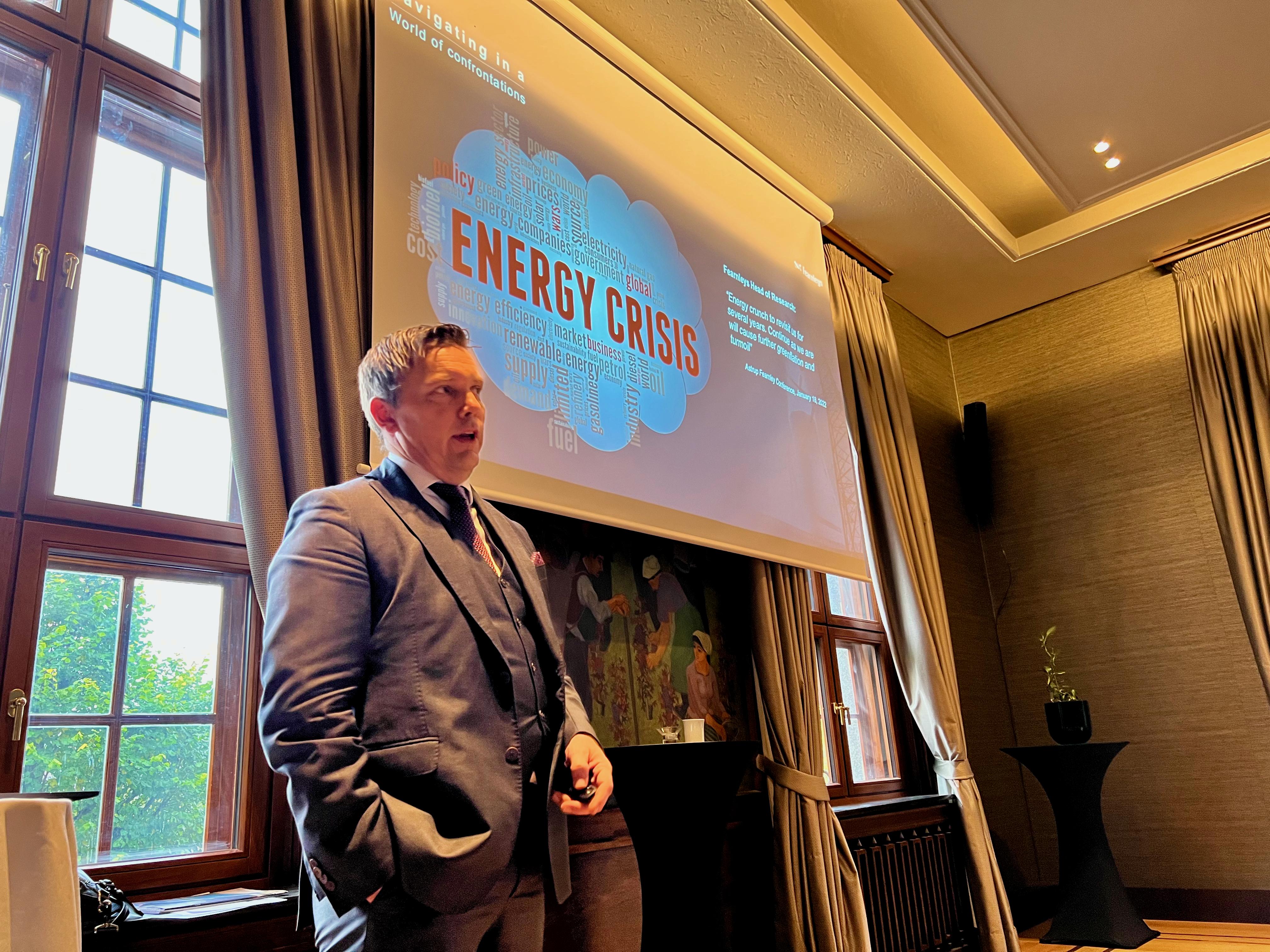
THE SHIPPING ACADEMY: We had our one 1-day course in Basic Shipping and Maritime Law on Tuesday 22 November, this time with as many as 22 participants from our members Bureau Veritas, DNB Bank (2), Fearnleys (2), and Maritime Optima AS (6), in addition to Alliance members Awilco LNG Technical Management, Cool Company Management, Höegh LNG, Klaveness Combination Carriers, PWC, SEB (3) and Wieco, as well as the Norwegian Maritime Officers’ Association (NSOF) and Ocean Industry Forum Oslofjord (OIFO)
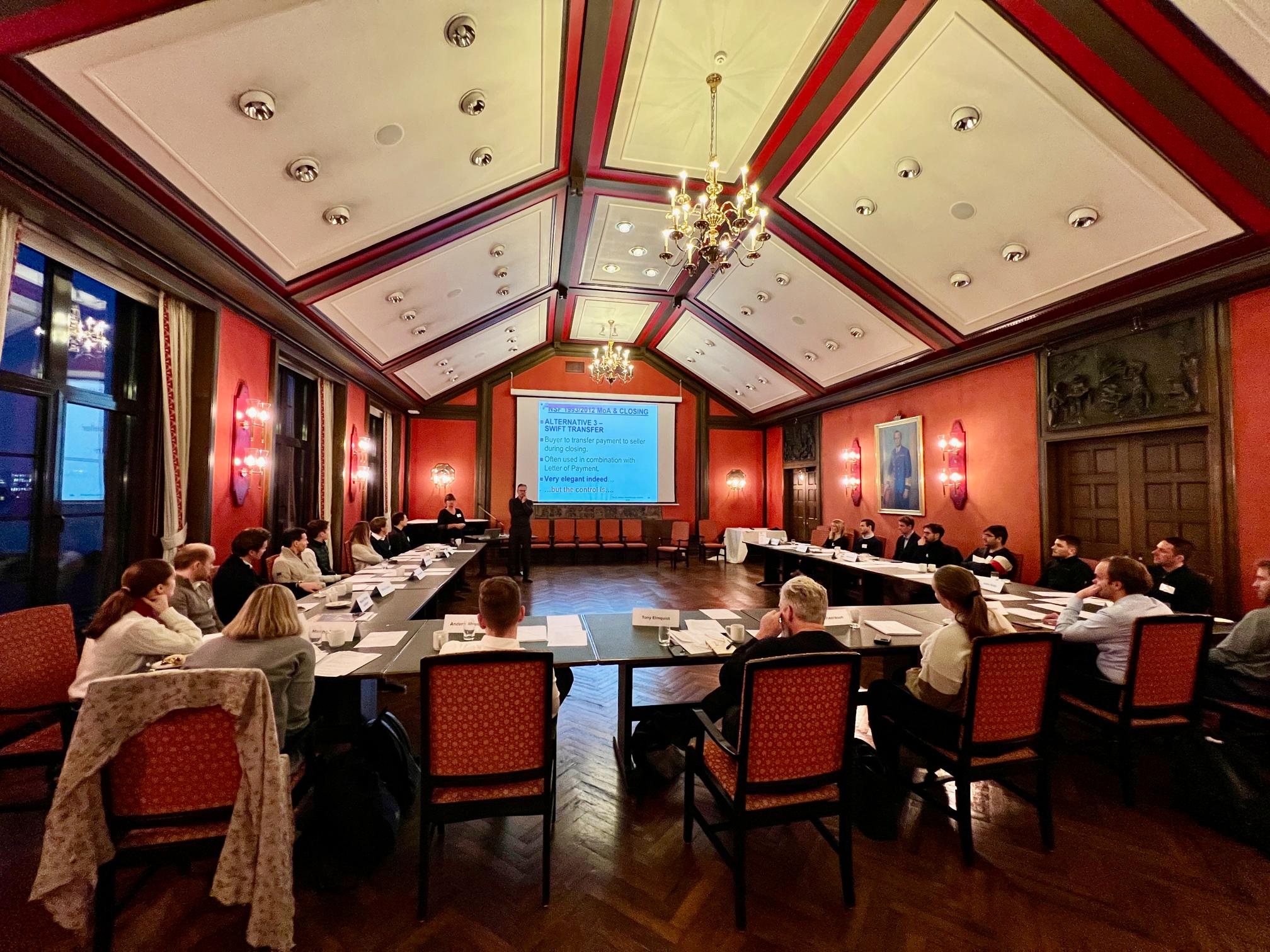
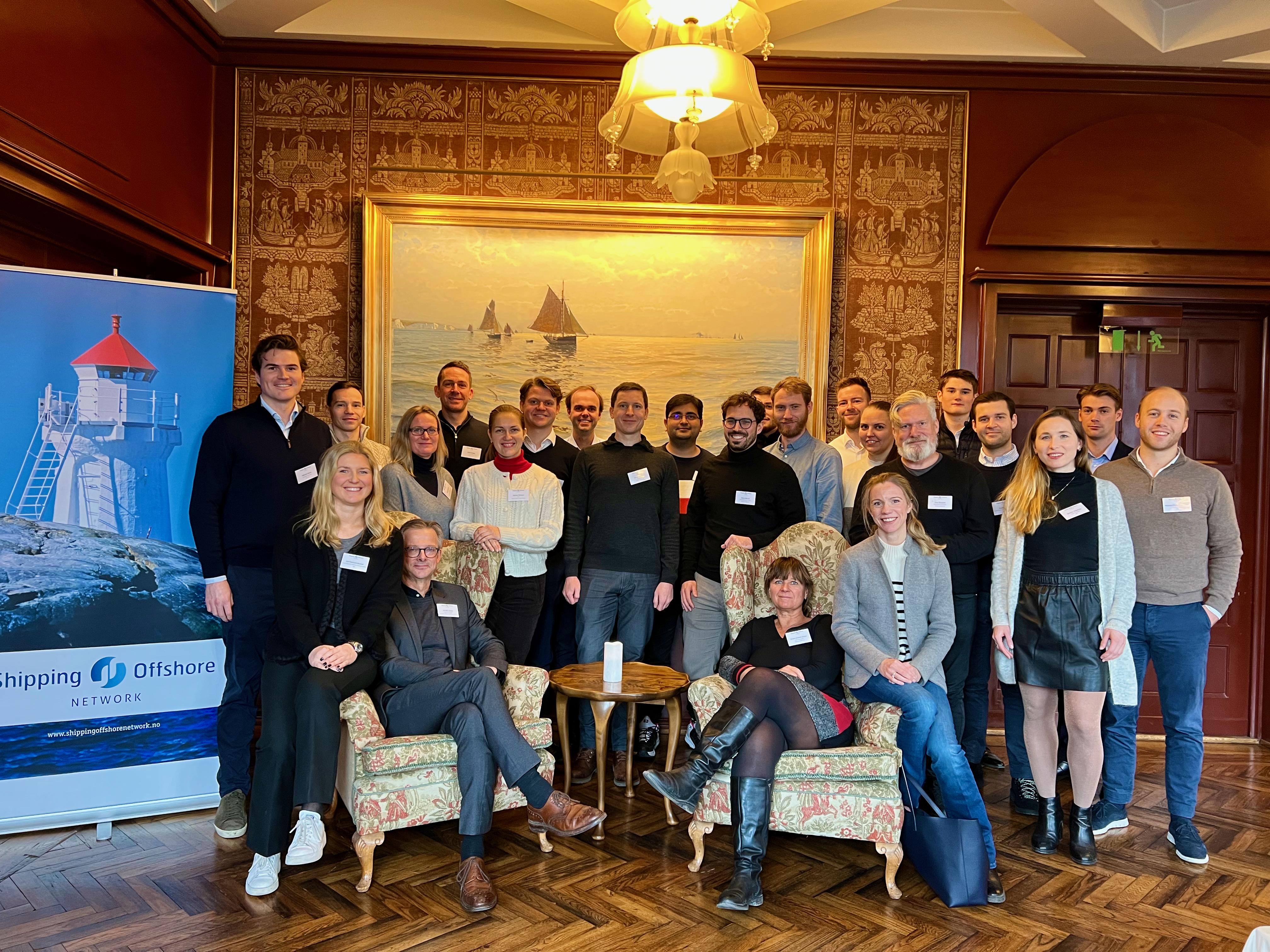
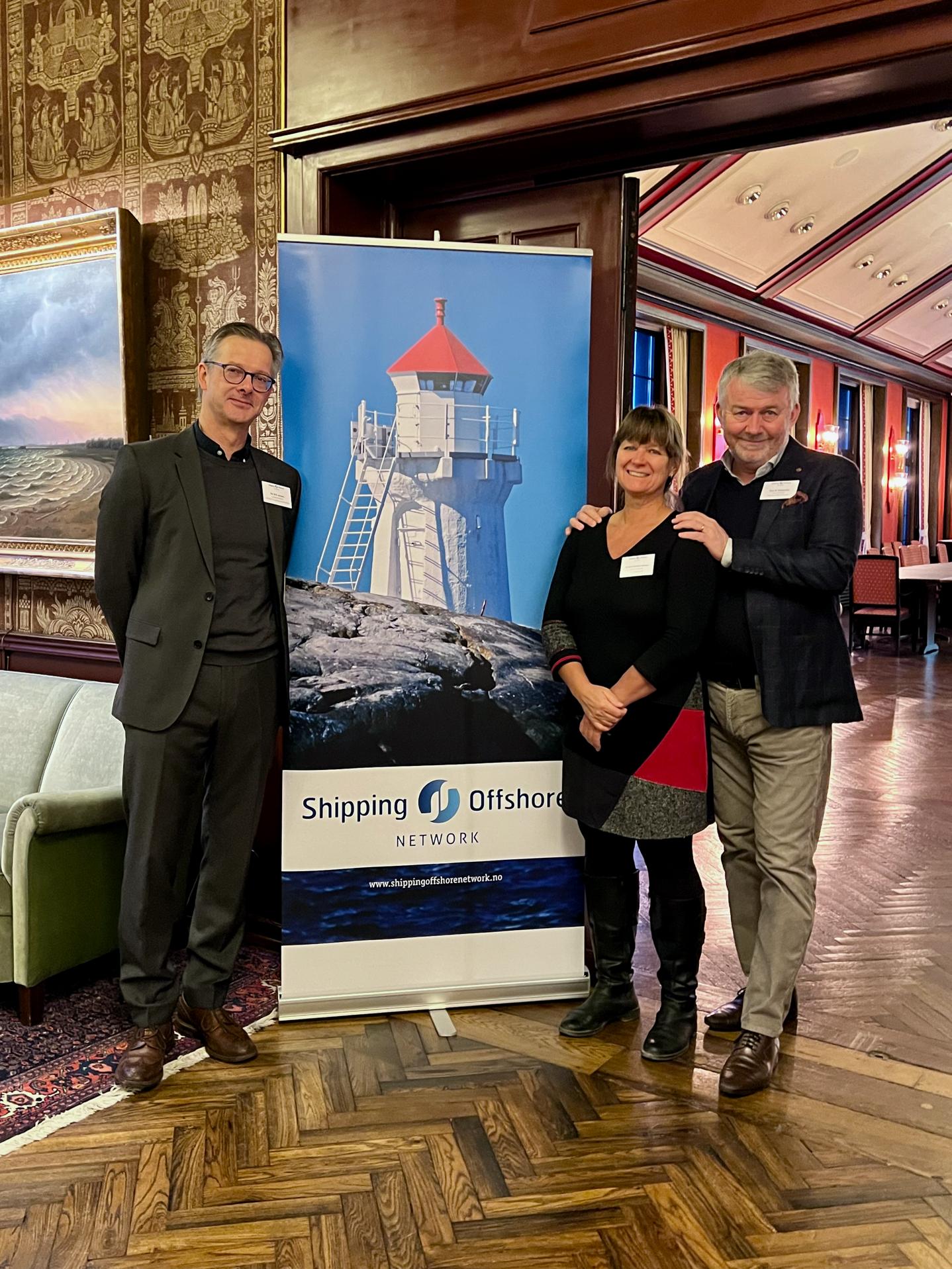
This year we had two lecturers: Tor Erik Jensen, ass. professor at BI and USN, and Kristin Omholt-Jensen, CEO and Founder of our member Maritime Optima AS, and board member in Bulkforum (now Shipping & Offshore Network) in 2010 when the Shipping Academy was established, initiated largely by her, who was then at BI Shipping
Topics for the day were:
§ Basic maritime law
§ The shipping industry and shipping cluster
§ Chartering and the charter parties
§ Ship management and legal contracts
§ S&P/Newbuildings: Ship sale & purchase
§ Ship finance and legal contracts
Then there was food, drinks & mingling.
Members
In 2022 we recruited the following new members:
¡ Cleaves Securities AS, Oslo
¡ Jebsen Management AS, Bergen
¡ TMF Norway AS, Asker
¡ World Fuel Services AS, Bærum (Lysaker)
No members left the Network this year.
As of 1 January 2023, this is the membership portfolio of Shipping & Offshore Network:
Financials
The P&L for 2022 (2021) shows a total turnover of NOK 1,344,067 (1,001,778) and a deficit of NOK –41,735 (33,610).
Membership Fee
The annual fee for 2022 was NOK 20,000, unchanged since 2011.
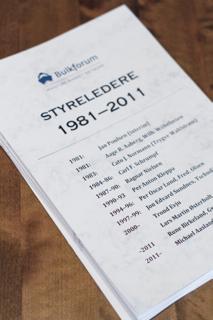
The Board 2022
Per Olaf Brett, Ulstein International AS, chairman
Margrethe Bøe Landro, G2 Ocean AS
Arnstein Eknes, DNV AS

André Borge, Wagle Chartering AS
Jan Peder Myklebost, Hydro Aluminium AS
Kjartan Bru, BNP Paribas SA Norway Branch
Helene Westfal-Larsen, Westfal-Larsen Shipping AS
Oslo, 14 February, 2023
Enclosed: P&L 2022, events overview, and our meeting programmes


